#it also balances between comedy and drama more than the other two
Note
hey gamo i got a fun question for u :) i wanna get more into yuri-centric stuff (women <3) and i know ur knowledgeable but idk where to start. could u maybe recommend me smth? or a lot of things i do not mind ^^ thank you in advance ur lovely
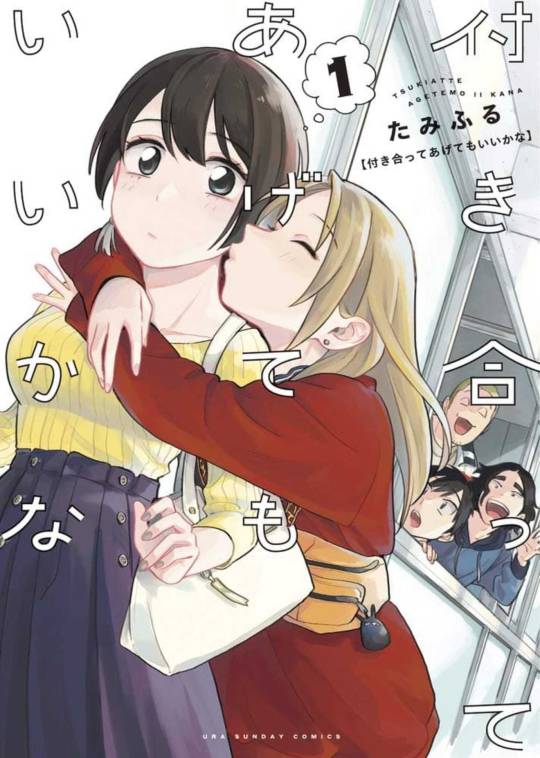
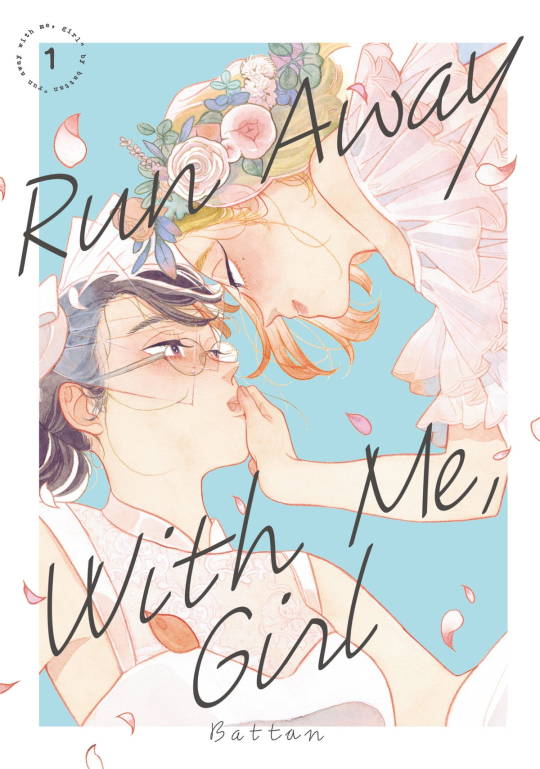

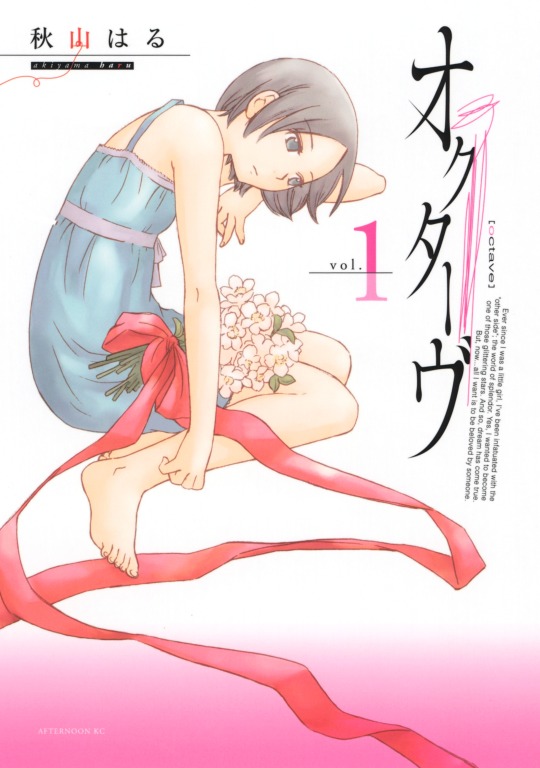
...I'm probably not as knowledgeable as a lot of people I'm mutuals with but here's some stuff I read a while ago and think is really great u_u
(Order is from top left going clockwise)
How Do We Relationship? by Tamifull
Run Away With Me, Girl by Battan
Still Sick by Akashi
Octave by Haru Akiyama
#mars-ipan#asks#fair warning for octave the translation is really rough#but I'd still say it's readable and you get used to it the more you read#at least I did but maybe I just have a high tolerance for this stuff#...it's also probably the most dramatic out of these four but it's still good stuff if you're into that#run away with me girl is also heavy on the drama and it features depictions of domestic abuse and misogyny#but it's handled with enough respect and tact so I didn't find it offensive or anything imo#how do we relationship is definitely my favorite out of these though#unlike the rest it's unfortunately not completed yet but what's out is REALLY good#it also balances between comedy and drama more than the other two#so even though it can get intense you get more of a breather I feel because there are so many light-hearted bits#I can say more about each one but I don't want to spoil so I'm trying to be vague#anyway I'm sorry for taking so long to get back to this ask please forgive me#or don't you'd be entirely justified
17 notes
·
View notes
Text
Full Moon kinda sucked :/ (Another HB Rant - Spoilers for Full Moon)
I hate to say this but I think Vivziepop has finally lost me. Now I'm not saying I'm no longer an HB fan, JMI was geneticlly enginered to get me addicted to whatever he's in meaning I could'nt stop watching HB even if I tried. However I am starting to doubt Vivziepops talents. I have no idea what happened between the first half of Season 2 and the second half but this kind of seasonal rot has to be studied in a fucking lab.
I want to like the episodes after "The Circus," I really do. I don't even hate Cherubs, but aside from Oops and the Mid-Special, every episode following The Circus has ranged from disapointing to awful compared to S1.
It's not even like I hate the episodes after The Circus either. Seeing Stars was okay for the most part, Exes and Oohs tried to do something, even Unhappy Campers introduced a potentally intresting character (and thats it). But these episodes have so many glaring flaws in my book that it's hard to grasp.
In my opinion, Helluva Boss was at its best during the balk half of season 1/The beginning of Season 2 (Truth Seekers-The Circus) and the decline in writing quality started at around Seeing Stars.
I made a long post that explains what about Truth Seekers I like so if you care even a little bit about my opinions, you can suffer through that rant, but to shorten it here, Truth Seekers is my favorite episode of the series because it balances the comedy and the drama expertly imo. Truth Seekers feels like Helluva Boss had finally stuck the landing at what kind of show it wanted to be. It showcased how Blitzo felt about his past relationships and his current one, it gave Moxxie a chance to be heard outside of his flaws (before the show decided they wanted to retread the same fucking plotpoint a couple more times), and it was pretty funny (comedy is subjective tho so feel free to ignore my feelings on comedy from here on out).
Ozzies is a good episode because, well, Asmodeus, but also it does more for Blitzo's character. It contrasts with Truth Seekers via two of the three halucinations calling him out on his shit, and it starts to build upon how he views his relationship with Stolas.
While I don't really like The Circus, what it did at the end for Stolas and overall how it setup the relationship for him and Blitzo was genuinly good imo. How it started with Blitzo initiating the one sidedness of their relationship and whatnot.
Notice how I'm talking almost exclusively about Blitzo as my reasons for enjoying these episodes more than others. And thats because Helluva Boss is at its best when it treats Blitzo as its main character. Even from the beginning he was the real star. Obviously you have characters like Stolas and Moxxie also getting focous, but even in those episodes, Blitzo still gets development, because Blitzo is the main driving force for the show. He's the Helluva Boss. He's the center, the emotional core. HB should be about HIM and HIS relationships to others.
Some of the worst episodes are the ones where Blitzo isn't really the main focous, I'm not saying that Blitzo automaticlly makes the show good or that he should be the only one get focus, but when you pull back and look at the series, almost every beloved episode have him (or him and Stolas) at its emotional center.
To keep this already long post from being absurdly long, I'll skip ahead to why I really didnt like the newest episode, Full Moon.
SPOILERS AHEAD
First things first, the Cherubs and Dhorks fucking suck ass as antagonists. They're annoying, they're not funny, and just like Crimson and Striker in Oops, they serve zero narritve purpose outside of being glorified cardboard cutouts for the main characters to fight. They are everything wrong with B-plots in media. Their only existence is to create artifical narritve throughlines that makes artifical suspence to keep the audience engaged like babies watching those baby sensory videos. "Oooo look its the Cherubs from the most nothing burger episode of Season 1. Oooo it's the Dhorks that are easily the most forgetable aspect of Truth Seekers. OOOhhh isnt it sooooo fucking hilarous how the Dhorks killed a bunch of children? Ohhh aren't you so invested to see these characters that mean absolutely nothing to the plot that Vivziepop is trying to sell the show with? DONT YOU JUST LOVE THESE KEY JINGLING ASS CHARACTERS YOU FUCKING BABY-"
I got a little carries away there, but my point is that Dhorks and the Cherubs are worthless slop that should be removed from the plot entirely.
Usually I wouldn't even care since 2/3 instances where useless villans show up to be useless, the main plot not involving them is really good (Refering to Oops and Truth Seekers).
But the main-plot in this episode is just as bad, if not WORSE than the B-plot.
Regarding my previous rant again, I was an avid defender of Stolitz up until maybe Western Energy, although in that case with the aftermath of Ozzies being handled mostly offscreen is more me being skeptical about Vivs pacing and writibg style. I didn't have a problem with the actual idea of Stolitz yet, just with the execution.
In actuality, my problem with the writing started in The Full Moon.
Even with me being an avid defender of Stolitz, even with me analyizng and disecting Blitzo's mentality and reasonings and emotional trauma, even with me trying to justify BOTH sides of this toxic relationship with no real abuser,

THIS does NOT come off as Blitzo begging to keep Stolas in his life because he cares about him and wants to be with him. I'm sure theres some of that in there and I still have faith that Viv try to put more of that into the execution going forward. But no matter how many times I watch this ending scene and the scenes before it, no matter how long I sit and think and think and think about this dynamic, this scene does NOT feel that way to me.
To me, this scene looks like a lower class citizen begging on his knees to the person whos essentaily employing them to let him keep his job to be able to feed his family and keep his colluges/close friends in work.
This feels like a man whos society is stacked against him trying to keep the one thing he has afloat.
I don't feel this way towards the entire scene. When Blitzo tries to avoid the whole conversation by trying to keep the transaction going, thats when I see more of the emotional side, but it still doesn't sit right with me how the dynamic is being represented.
Stolas explains it pretty well in the moments after. He says "This transactional thing we have, its not right anymore. It hasn't been. It never was. And now, all I can see is how wrong it is to be teathered to someone in such an unfair way. And not know how they feel."
To me, this finally feels like Stolas coming to his senses and realizing that he and Blitzo's relationship is unbalanced. He sees that Blitzo's reliance on him is unfair, so he works to end it.
My problems start to arise again when Stolas reacts to Blitzo trying to play it off again as Roleplay.
I can understand his side of the coin, how he feels that Blitzo only wanted him for sex and nothing more, or how he believes that Blitzo doesnt really care for his feelings and only stays for the book, and when giving Blitzo the option, he chooses to ignore it.
But I still cannot get over how icky this scene makes me feel. Blitzo has made it clear how he thinks Stolas feels about their relationship. In the Just Look My Way music video it seems that Stolas somewhat realizes that Blitzo is hurting in some capacity. When Blitzo vents his frustraitions, Stolas says "I didn't know you thought so lowly of me" which doesnt make any fucking sense in response to what Blitzo is saying.
Again, its that image of a person mistreated by society begging someone who is privlaged to let him keep his job. I cant stomach this idea that Stolas got his fucking feelings hurt over someone he indirectly played with for his own pleasure and to escape his marrige venting their frustraitions about how THEY feel about it. HE HIMSELF admitted that the relationship was unfair, so when Blitzo says "You treat me poorly and expect me to believe when you suddenly express your feelings for me? Can I get a minute to actually process what you said," its litteraly just parroting what Stolas was saying.
Stolas knows how Blitzo feels. He knows Blitzo is hurting. And yeah past relationship trauma isnt an excuse to be shitty, but it's not like Stolas made it very obvious that he did actually care about Blitzo's emotions.
Up until this point the relationship has been one sided on both sides. Both parties think the other doesnt care or that the other is just using them for something. Both sides caught feelings and didnt want to admit it, and Stolas was the bigger person for trying to initiate that discussion. But with the ending line Stolas says and all the promotional matreal being released for the upcoming seasons, the show feels like its going to make Blitzo out to be the one in the wrong when he isnt. Blitzo did the same fucking things Stolas did, so why does it feel like the next few episodes are just going to be "Blitzo sucks and we hate him." Like are you fucking serious??
Maybe I'm reading the whole thing wrong, who knows at this point.
39 notes
·
View notes
Text
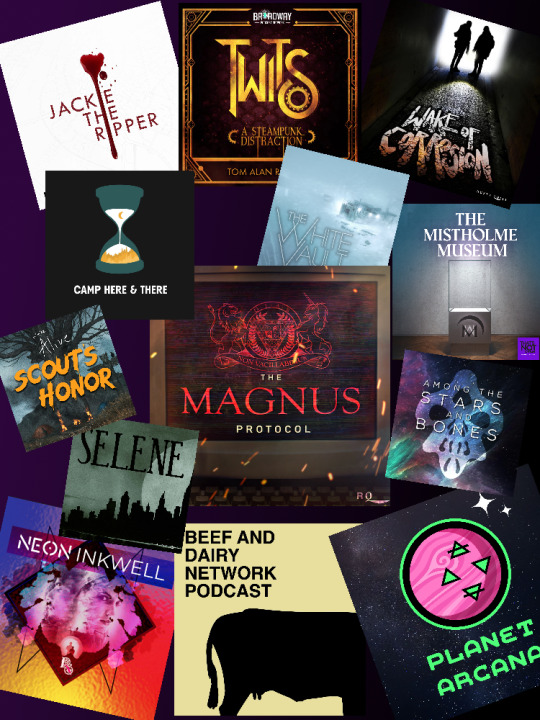
✨APRIL/MAY LISTENS✨
hi i’m back, i’ve just finished my degree and do not have enough of a brain to write an in-depth of anything. but! here’s some of what i’ve been shoving in my earholes for the past month, in no particular order.
The Magnus Protocol — (season 1 ongoing) continues to blow my fucking mind. the sound design/music combo for this series is of particular note, it really just… mwah. elevates the text so much for me. i also continue to be impressed by how well this works as both a standalone series and as a delicious trail of candy for those of us who loved Archives. we’re halfway through s1 now and all i can think about is alice dyer.
Beef and Dairy Network — (ongoing @ 109 eps) a partially improvised absurdist comedy pod set in a world that is bizarrely obsessed with beef. my qpp listened to one episode and called it “distilled british humor” which feels… correct. i’ll be real, i’m actually mad at myself for not getting into this one sooner, but on the other hand having a long binge of it has been divine. i would kill to go to one of their live shows.
The White Vault — (5 seasons, 10 eps apiece) not including goshawk because i’ve barely started on that. but the main series… woah! god, i totally didn’t think this was going to be my thing but i could not put it down? the first season is definitely slower than i usually prefer but the characters kept me hooked and by season 3 the narrative completely took over my brain. i also love how well they sold the found audio format, it WORKS. gold fucking star, highly recommend.
Jackie the Ripper — (3 seasons, 5 eps apiece) put this one aside for a rainy day and binged it all at once. deeply wish there was more of it. it’s a raunchy crime drama with a downtrodden detective at the helm who i SWORE i wouldn’t root for but ended up doing so anyway. do recommend! if it sweetens the pot, the protag has the same VA as watson in the currently popular Sherlock & Co.
The Mistholme Museum — (6 seasons, soon to be complete) people have been recommending this to me for years and i just never got around to it, but on the bright side — it was an incredible binge. anthologies aren’t my strong suit but i found the framing device really strong and, crucially, it develops a meta plot that balances really well. biggest strength for me was the narrator, but i can’t explain why without spoiling some key plot developments. just trust me.
Wake of Corrosion — (4 seasons, final ongoing) very cool apocalyptic suspense/horror. i initially loved this show for the dynamic between the two leads, who are brothers trying to reconnect on a solitary camping trip when the world decides to go wonky. i ended up loving the worldbuilding as well. final episode drops very soon.
Neon Inkwell: The Pit Below Paradise — (miniseries, ongoing) this one has a bit of a western vibe and heavy religious/culty overtones, which isn’t my favorite genre. but i think each of the main characters has been developed really well thus far. + many fun cameos from members of the production team, those are really fun to try and spot :)
Twits: A Steampunk Distraction — (2 seasons, 5 eps apiece) very silly comedy of errors from the pov of a bumbling aristocrat. can’t say too much without giving the end of s1 twist away. i highly recommend it if you’re looking for some lighthearted listening. the ending credits are also very cute.
Planet Arcana — (ongoing @ 71 eps) i’m so bad at TTRPGs but this one has such a unique setting, i’m just captivated. tarot-flavored sci-fi adventure for anyone interested. i’ve made it through the first arc and the party has already experienced a crazy amount of development; stoked to see what happens next.
Selene — (ongoing) anthology about a spooky little town with a vintage vibe. single narrator, quite talented. i’m not always easily invested in anthologies but the narrator here really sells it for me, and (!) i think he writes children — both their thought processes and dialogue — very realistically. which is my grandest compliment.
Camp Here & There — (s1 complete @ 33 eps, hiatus?) i put off listening to this for a rainy day because i’d heard nothing but rave reviews and they weren’t lying. this is quite literally the ONLY pod i’ve come across that completely captures the same magic that WTNV did for me on first listen. the creator is kinda going thru it so idk if s2 is going to happen but i really hope so. even if not, s1 is very worth listening to. it’s wacky and sinister and i just love the narrator, it’s hard not to.
We’re Alive: Scout’s Honor — (8 ep miniseries, complete) imagine WA from the perspective of some awkward tweenagers. what’s not to love? the gore is really heightened by each characters’ stage of emotional development. i especially loved the conclusion but i won’t spoil it here ;)
Among the Stars and Bones — (2nd season ongoing) sci-fi drama with a solid first season, really nice narrative tie-up, but the second season was SUCH a glow-up nonetheless! + the most memorable karim kronfli performance of all time IMHO.
#audio drama#podrecs#i thought that this would be a cute lazy sort of graphic to make and the layering was actually a nightmare#so i kind of gave up but i hope it looks. okay#anyway these are all great shows and i’m happy to talk more about them in future#i’ll have a brain again soon. i think
44 notes
·
View notes
Text
A (Negative) Review of Tom Taylor's Nightwing Run - What Went Wrong? Villains
Introduction
Who is Dick Grayson?
What Went Wrong? Dick's Characterization
What Went Wrong? Barbara Gordon
What Went Wrong? Bludhaven (Part 1, Part 2)
What Went Wrong? Melinda Lin Grayson
What Went Wrong? Bea Bennett
What Went Wrong? Villains
Conclusion
Bibliography
During a discussion, Dick Grayson Fan C explained the importance of a balanced hero and villain dynamic by describing their relationship as inherently “symbiotic.” The two, after all, are interlinked, and the success and failures of one affects the way the audience perceives the other. When the audience knows that the hero will win the final confrontation, the questions surrounding how they will do so and what price they’ll pay to achieve said victory is what creates tension. In other words, the way in which a struggle unfolds is just as, if not sometimes more, important than its outcome.
Note that this symbiotic antagonistic dynamic is not limited to physical confrontations. A good hero-and-villain relationship is also an exploration of the protagonist’s psychology, their motivations, and the thematic questions of a story. A well-crafted villain should not only be providing a challenge to the hero in the battlefield, but also call into question the truths — or lies — that the hero believes in.
Taylor’s antagonists fail to provide Dick with any such challenges. And, as such, they fail to provide Dick with the opportunity to truly demonstrate who he is and what values Nightwing embodies
To prove my point, I wish to compare Taylor’s handling of Blockbuster with that of Chuck Dixon and Devin Grayson. While I considered also analyzing Heartless in detail as well, because the main Heartless confrontation is currently unfolding as time of writing, and because my main gripes with how Heartless was handled during the beginning of the run have already been addressed in other parts of this essay, I opted instead to keep my mentions of him brief. Furthermore, not only does Taylor’s parroting of Dixon’s and Grayson’s runs makes the comparisons between their Blockbusters unavoidable, but his take on Roland Desmond perfectly demonstrates how his simplistic morality contradicts the nuanced themes of social justice that seem to interest him.
(Similar to an earlier disclaimer I made on Dixon, I want to make it clear that just because I am comparing Grayson’s run favorably to Taylor’s, it does not mean that I am unaware of the issues present in her own story, nor that I disagree with much of the criticism directed at it. Despite enjoying much of what she wrote, I also readily concur that there are problematic elements to it, and I often found myself questioning her intentions as I was unable to discern them. But that is something that would deserve its own essay and I do not want to further derail this one by discussing the extensive controversies about Grayson’s run and the way it is often regarded by Dick Grayson fans. Regardless of one's opinion of Grayson’s statements, I believe it is unquestionable that she handled Blockbuster’s ruthlessness and the way he personally terrorized Dick through a form of targeted persecution that was mentally and emotionally torturous was leagues above the generic intimidation tactics employed by Taylor’s Blockbuster.)
When I claim that Taylor’s characterization of Blockbuster reveals his simplistic morality, I do not mean to imply that I wish for Blockbuster (or even Heartless, for that matter) to be sympathetic. I do not believe that they must have redeemable qualities that endear them to the reader in order for them to be interesting. While I enjoy the tragic villain trope, I’m also a big fan of the terrible villain who gets under your skin and inspires such hatred that you cannot wait to see them defeated. I believe that just as a person can enjoy both comedies and dramas without thinking one genre is superior to the other, we can also have all sorts of villains and enjoy them on their own terms.
That being said, I do expect villains to be interesting. I expect them to be meaningfully contributing to the story not only in terms of narrative conflict, but in challenging the protagonist, in creating stakes, and in being in conversation with the themes explored in a story, whatever those themes may be.
So know that when I am criticizing Taylor’s villains, I’m not doing so because I wish they were completely different characters from whom they were intended to be. When I critique their simplistic morality, I do so because Taylor invited such criticism when he coated his run in the veneer of social and political justice commentary by alluding to real world problems and trying to show how Dick Grayson would resolve them.
Let’s start by defining who Roland Desmond is, what conflicts his presence generates, and what he is meant to stand for in the narrative.
When examining Redondo’s design for this character, their intentions come through almost immediately: Blockbuster is meant to be threatening, corrupt, and ruthless. He is meant to be the type of oppressor who enriches himself at the expense of others. He yields his power to remain on top of the food chain, shamelessly bribing politicians and threatening his enemies. He will stop at nothing to retain control, he will not hesitate to destroy those who so much as dare to think about standing in his way. He has no sympathy for others, he does not care about their suffering, and he will gladly sacrifice their lives and the lives of their loved ones to get what he wants. All of these characteristics are physically manifested in his design, in which his oppressive frame demonstrates how he overpowers others and his giant hands are shown to be the type that could crush one’s bones just as his shadowy reign over Bludhaven crushes the city’s soul.
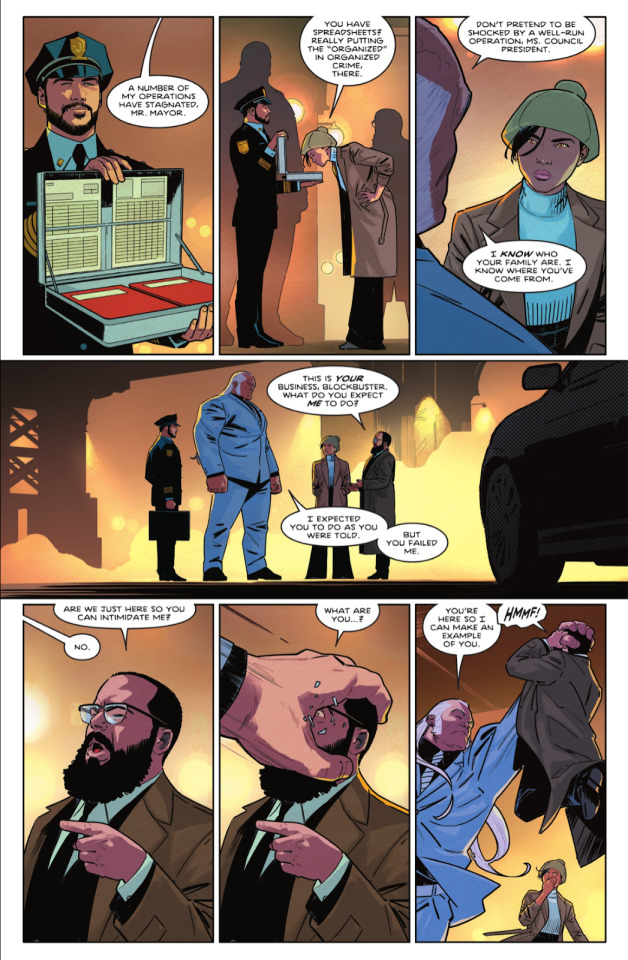
(Taylor, Tom, writer. Redondo, Bruno, illustrator. Leaping into the Light Part Two. Nightwing: Rebirth. 79, e-book ed. DC Comics, 2021. pp 14)
We can see this also through the dialogue of the story. For example, in #81, Melinda gets sworn in as mayor and Blockbuster’s men, in order to demonstrate the power they have over the politicians in the city, give her a suitcase full of money as a representation of the bribes that will be coming Melinda’s way.
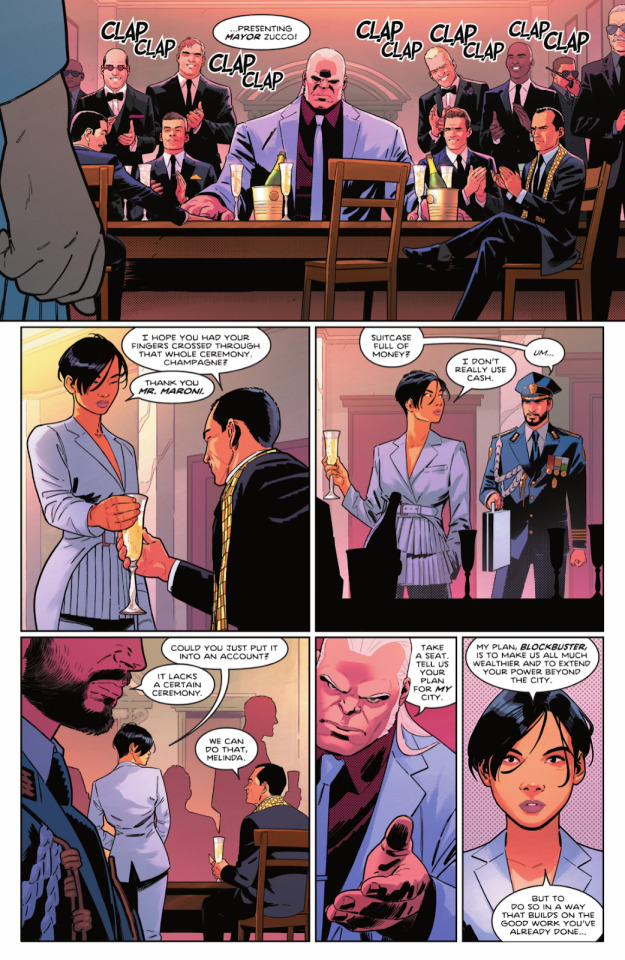
(Taylor, Tom, writer. Bruno, illustrator. Leaping into the Light Part 4. Nightwing: Rebirth. 81, e-book ed. DC Comics, 2021. pp 04)
Melinda, in order to continue her work undercover, plays into that by stating in a line that is as devoid of personality as it is of subtlety that, as mayor, she will make them all wealthier.
Similarly, in #83, Blockbuster states (also with little personality and little subtlety) that he owns the courts, that he sees himself as entitled to Bludhaven, and that because of the power he yields, he sees himself as invincible.
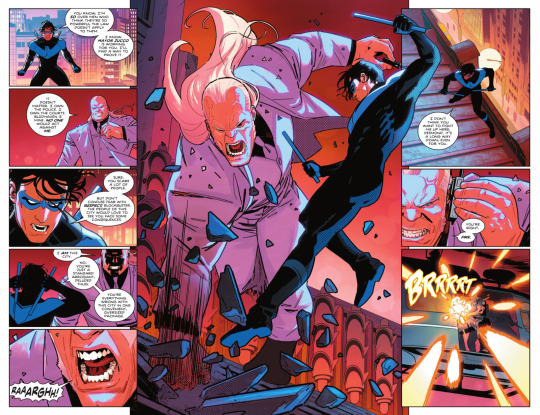
(Taylor, Tom, writer. Redondo, Bruno, illustrator. Leaping into the Light Part Six. Nightwing: Rebirth. 83, e-book ed. DC Comics, 2021. pp. 08)
Nightwing reaffirms this idea in that same issue when he says (also devoid of personality, subtlety, and this time charm or wit) that Blockbuster is “everything wrong with this city in one convenient, oversized package.”
This is what the conflict between Blockbuster and Nightwing is meant to symbolize — a struggle for the city’s future. Will Bludhaven continue to crumble under Blockbuster’s rule, or will Nightwing free it from his corrupt grip so that its citizens can finally have a chance to thrive? Even in the 1996 series, during both Dixon’s and Grayson’s runs, Blockbuster did not pose a threat to Dick’s morals or his world view. He did not make Dick question the way he saw people. Blockbuster’s targeting of Dick Grayson and his loved ones demonstrates how those with privilege go after the people who are fighting for change. Dick’s exhaustion and hopelessness mimics the same sense of helplessness one feels when it seems like the entire world is against you and the consequences for doing what is right can seem too great of a price to pay.
For this reason, Blockbuster does not need to be complex. He does not need to be sympathetic. But he does need to be powerful, threatening, and ruthless. He must push Dick to the edge, to make it seem like all it is lost, and in turn, when Dick finally pushes through and wins, it is a victory on both a personal and a societal level.
And this is where Taylor fails miserably.
Now, I have stated previously how, despite Taylor’s attempts, his rendition of Blockbuster comes off as flatly incompetent rather than threatening. I have discussed this under the context of how it influences the way Dick’s and Bludhaven’s portrayal. Now, I wish to dig deeper into this issue.
We are told of countless attempts on Dick’s life, but the only ones shown are overcome by Dick and his allies with ease. Either that, or the tension is undermined by a one-line joke or a general tone of casualness that fails to properly convey the stakes of the moment. Any threat that could have been created with Haley’s kidnapping or any intimidation tactic is destroyed by the gimmicky nature of the issue. This makes Blockbuster less of a threat.
And yet, we are told by Wally that Dick is stressed and overworked. But because there is not a lot of tension on screen, that telling rings hollow. The reader is not shown that Dick is overworked, and he is not shown truly struggling alone against the obstacles he does face, so this idea of Dick coming apart at the seams because of Blockbuster is not something the reader gets to truly experience. As a result, it often appears that Dick is coddled by his loved ones as everything always ends up alright with little effort made on their part. Rather than witnessing true danger take a toll on Dick, we are simply told this is something that is happening.
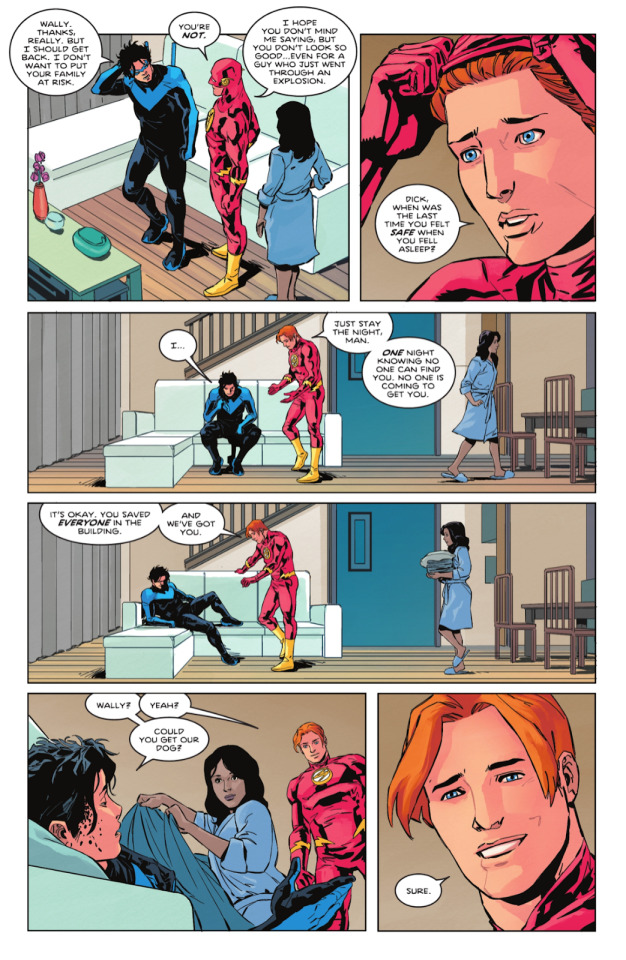
(Taylor, Tom, writer. Redondo, Bruno, illustrator. Get Grayson Act Three. Nightwing: Rebirth. 90, e-book ed. DC Comics, 2022. pp 16)
By comparison, when Grayson first wrote this same story nearly twenty years ago, she made it carry weight. She made it have consequences. While Dick was already coming apart from a myriad of different stress factors that unfolded on screen (overworking himself as Nightwing, as a police officer, saving Amy from Deathstroke, being fired from his job, Babs breaking up with him, and finally the circus fire), it was the explosion that made Dick fall apart, serving as the catalyst for his downward spiral. As Dick hunts down those Blockbuster employed, the readers get to see Dick’s exhaustion, Dick pushing himself to his limits, sleeping on fire-escapes while wearing his Nightwing uniform because he cannot bring himself to stop.
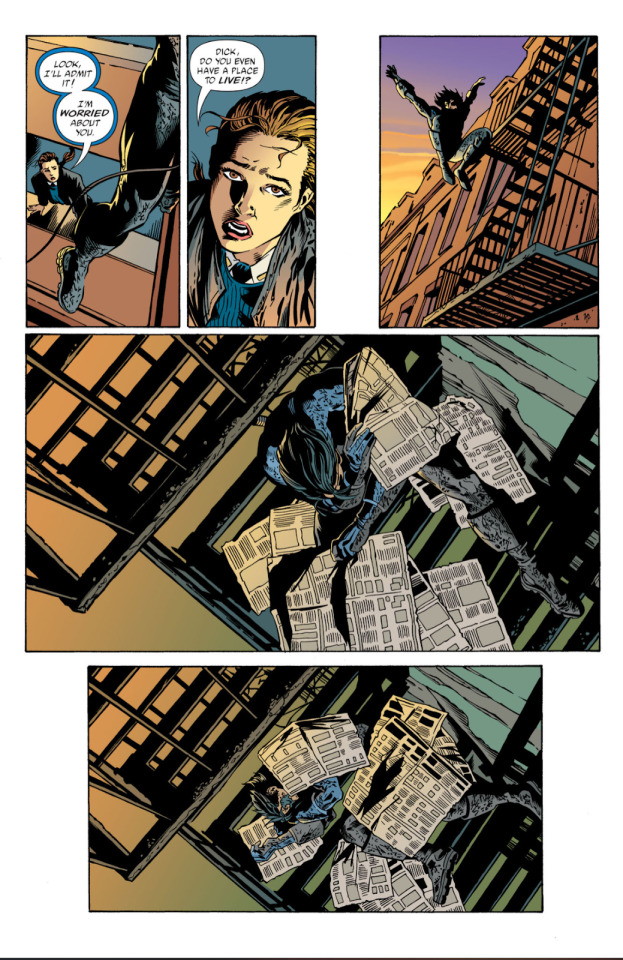
(Grayson, Devin, writer. Zircher, Patch, illustrator. Rekindle. Nightwing no 91, e-book ed. DC Comics, 2004. pp. 15)
Similarly, when the Judge returned to Bludhaven in The Untouchable, we see Dick keeping count of the bodies he left behind, we see Dick push through a bullet wound and beatings, we see him chase the Judge restlessly while neglecting his personal life. In both cases, we see the consequences of what Dick’s failure means, we see him struggle with those outcomes, we see what is at stake if Dick loses. And that, in turn, makes us not only care, but become invested in his success.
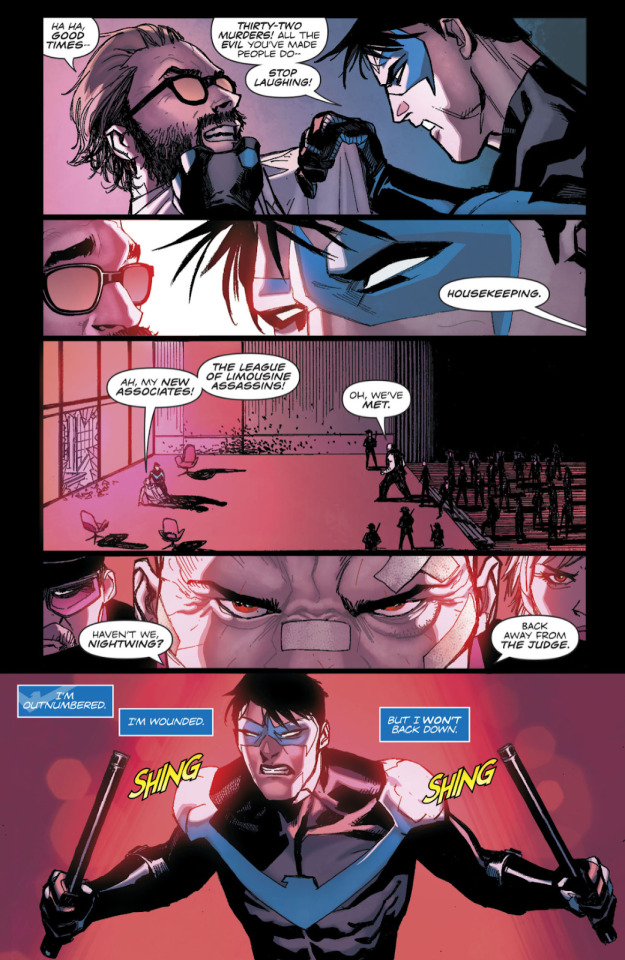
(Humphries, Sam, writer. Chang, Bernard, illustrator The Untouchable: Chapter Four: Infiltration. Nightwing: Rebirth no. 38, e-book ed. DC Comics, 2018. pp. 19)
By contrast, in Taylor’s run we never see any of that danger, and the few times we are presented with some threat, the conflict is handled with laughable ease. Blockbuster’s plots are foiled without Dick ever needing to do much of anything as he mostly relies on others to come to his aid. In this Nightwing solo series, the Titans, Batman, Robin, and Batgirl often do much of the hero-ing. Rather than putting the spotlight on Dick as a hero, Taylor lets others take the center stage, making this into an almost ensemble book. Because of this, the idea of Dick being near a breaking point, exhausted, and feeling unsafe wherever he goes is not supported by the narrative. By not giving Blockbuster a win, Taylor undermines the story he is attempting to tell.
This continues on through Nightwing #91. While Wally and Dick’s friendship were portrayed rather nicely, the villain that Taylor so ominously built up is taken down with an ease that is devoid of tension. The villain who is supposedly so good they’ve kept their existence a secret from Batman himself is quickly undermined by Taylor’s unwillingness to have his characters struggle.
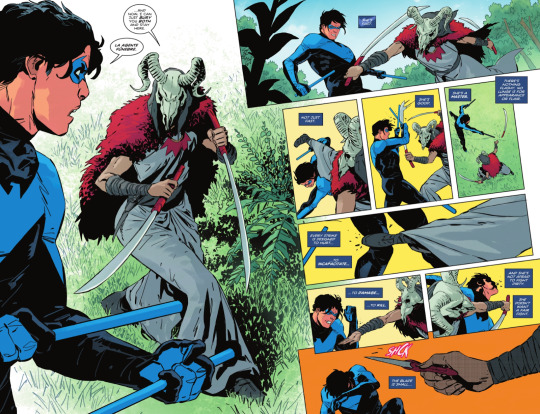
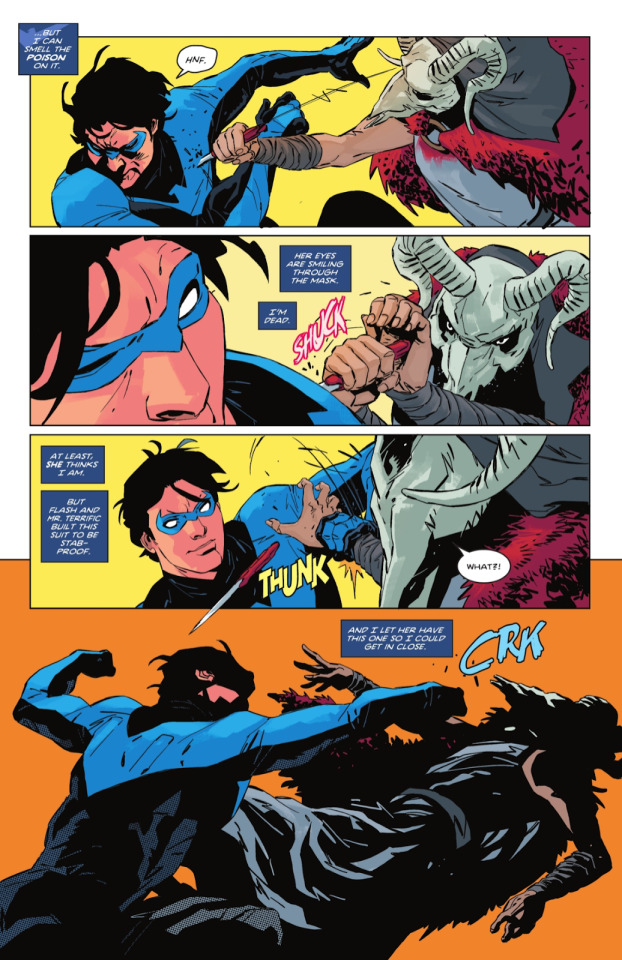
(Taylor, Tom, writer. Redondo, Bruno, illustrator. Get Grayson Act Three. Nightwing: Rebirth. 91, e-book ed. DC Comics, 2022. pp 16-17)
Besides the poor execution of his plans, however, it must be stated that Blockbuster’s plans and his motivations are poorly developed. Again, I’m not saying that Blockbuster needs to have a single sympathetic aspect to his character, but he does need to be threatening, and he must have some internal logic. Looking at the story Taylor has created, I wonder… Why does Blockbuster care that Dick Grayson created the Alfred Pennyworth Foundation? Why does he care about the creation of Haven? I understand that Blockbuster is meant to be a corrupt crime boss who wants to retain control of the city, but how does Dick building Haven interfere with his plans? Why was one billionaire throwing his money around to help homeless youths a bleep in his radar? Blockbuster already has politicians and the police force in his pocket while Bludhaven’s systems were constructed to benefit him and those who endear themselves to him. So why is he so focused on destroying Dick Grayson and not Nightwing?
I am trying to restrict my comparisons to DC Comics media, but in this, I cannot help but think of President Snow’s portrayal in the Hunger Games movie adaptations. In a movie-only scene, President Snow tells Seneca Crane about the importance of having a winner in the games. He explains how it is about letting the people have hope. As he put “A little hope is effective, a lot of hope is dangerous. A spark is fine, as long as it's contained.”
In other words, giving the people a spark of hope to keep them distracted can help prevent mass mobilization required to disrupt the system. Give them a goal to focus on, and you can redirect their attention. It would, then, be far more sinister and make far more sense from a narrative standpoint if Blockbuster allowed Dick to focus on his one project so that instead he would not turn his attention to Blockbuster. Perhaps he could have attempted to manipulate the project from within, folding it into Bludhaven’s corrupt social systems. Dick would have been that little spark that Blockbuster could have cultivated, giving the people of Bludhaven "hope" so that they would focus on that and not on what is going on behind the scenes. The narrative arc, then, would focus on Blockbuster failing to contain the spark as Dick became the flame that breathed true systematic change.
I do not want to dwell too much into fixes, as I merely wished to analyze Taylor’s run and not to go full on script-doctor and rewrite the entirety of his story. Rather, I just wished to use that as an example of how Blockbuster does not have sound plans or internal logic, and that, too, contributes to how his character comes across as incompetent and nonthreatening, and as a result, even his supposed ruthlessness is undercut.
Taylor’s Blockbuster does not have a concrete goal. He wants power and money, yes, but for what purposes? And how does he acquire said power and money? Why is he threatened by Dick Grayson’s personal project? How are his intimidation tactics challenging Dick in an interesting way? How are Blockbuster and Nightwing meant to narratively play off each other? How are Taylor’s Blockbuster tactics any different from a generic villain with any other name?
To be fair to Taylor, I do not believe Dixon managed to fully nail this part of Blockbuster’s character. I did not find Dixon’s writing of Blockbuster to be a particularly compelling part of his run. However, Dixon countered this lack of substance by leaning into what Blockbuster was meant to represent — the system inside the machine that allowed evil to flourish. Blockbuster’s influence may have been everywhere, but Blockbuster himself was hardly ever confronting Nightwing directly. Dick was fighting a war on multiple fronts, and while he could stop an enemy on his right, two more appeared on his left. The way the struggle between Blockbuster and Nightwing played out during Dixon’s run emphasized why protecting Bludhaven was so difficult — because there were so many immediate crises that needed to be dealt with on the surface, it was difficult to get to the root of the problem.
This was why, during Dixon’s run, Blockbuster could remain a threat even if he would remain unseen for long stretches of time. And this was why when Dick stopped one of the underlings, Blockbuster himself could remain an intimidating force. Blockbuster’s machinations were varied — some of his plans targeted Nightwing directly; others Dick only stumbled upon when investigating a matter he believed to be unrelated. Furthermore, the limited number of allies and the prospect that Blockbuster could only be taken down for good once his grip on other institutions of power and influence were weakened emphasized just how this was no ordinary fight, but rather a mission requiring Dick to operate on multiple fronts and strategize on a long-term basis.
Taking down Blockbuster was a multi-step process. Each of said steps offered their own challenges and opportunity for storytelling, for fleshing out Bludhaven, and for allowing Dick to grow as the protagonist of the story.
Dixon’s approach to Blockbuster requires Blockbuster to stay in the background, looming over the city as Dick fights his way forward. It’s why he remains present for all 70 issues of Dixon’s run without undermining Dick’s competence or his dedication to his city — as a stand-in for corrupt power, Blockbuster himself is not an immediate threat even if he is the powerful underlining one. Dick must constantly fight others in order to eventually be able to fight Blockbuster. To borrow video-game terminology, Blockbuster is the final boss, and Dick must first go through a myriad of levels and smaller enemies before he gets to finally take down Blockbuster for good.
It was Grayson who made the conflict between Dick and Blockbuster personal and, as a result, far more sinister. After the death of his mother in a car pile up caused by Nightwing’s activities, Blockbuster was determined to get his revenge on Nightwing. After finding out Nightwing’s civilian identity, Blockbuster came up with a chilling plan that was specifically made to destroy Dick from the inside out. Blockbuster understood that Dick did not value his own life, but rather, those of the people around him. And so, he decided that rather than killing Nightwing, he would instead kill everyone around Dick, tormenting and terrorizing him until he felt as if he were poisonous. What was so poetic about this strategy was that it mirrored what, in Blockbuster’s eyes, was Nightwing’s biggest sin: the danger he imposed on others through his actions which resulted in the death of Blockbuster’s mother.
As you can see, in this scenario, Blockbuster has become more of a proper character rather than just a stand in for corruption. That is not to say that wielding power for self-serving purposes at the expense of others isn’t a factor in his character during Grayson’s run, but rather that while Dixon’s Blockbuster was more of an embodiment of an idea, Grayson’s was more human, with more personal motivations. One approach is not inherently better than the other, they simply lean towards opposing sides of the spectrum, and that affected the type of story told and the type of confrontation Dick and Blockbuster had during their runs.
Because Grayson took a more personal approach towards Dick and Blockbuster’s dynamic, she also fleshed out their relationship to the point that it was not generic. Blockbuster’s campaign of terror against Dick was intimate, for it was something that could only have played out between these two characters. And while Dixon laid out the groundwork to build Blockbuster into a threatening figure by the time Grayson took over the title, Grayson’s strategy to have Blockbuster go after those around Dick allowed her to have Dick win and lose simultaneously.
Blockbuster starts his campaign of terror slowly. First, getting Tarantula to contribute to Dick and Babs’ breakup. While she is not the sole reason why they break apart — they are shown to have had some tension long beforehand that comes from incompatible personalities and desires — she does become a factor in their falling out. This ends up isolating Dick even further, who was already stressed due to the fact he lost his job once his boss and superior Amy discovered he was Nightwing.
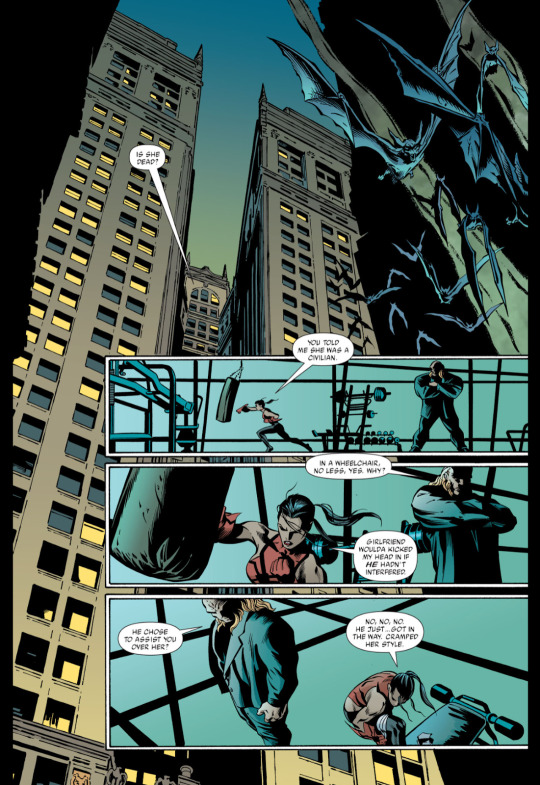
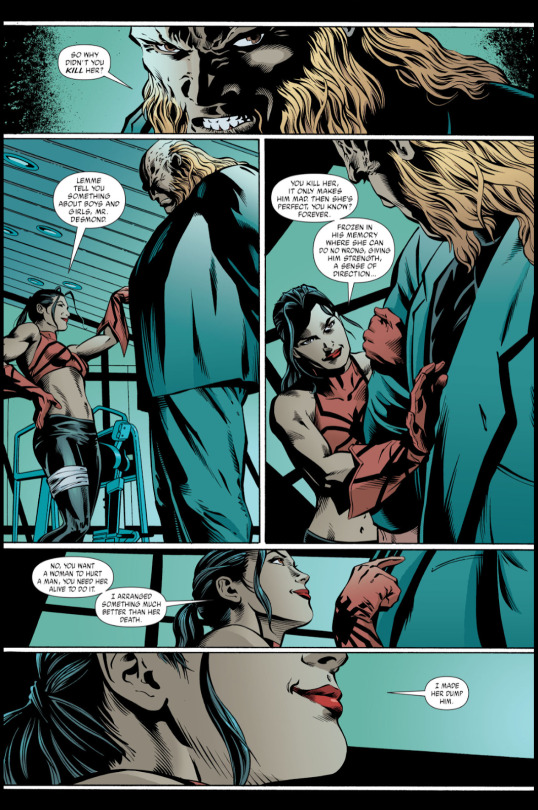
(Grayson, Devin, writer. Zircher, Patch Snowball. Nightwing. 87, e-book ed. DC Comics, 2003. pp 17 - 18)
Then, Blockbuster strikes closer to home by hiring Firefly to set fire to the circus Dick grew up in. While Dick was able to save many people who were inside the tent (and had his own life saved by Zitka), over twenty people lost their lives in this incident.
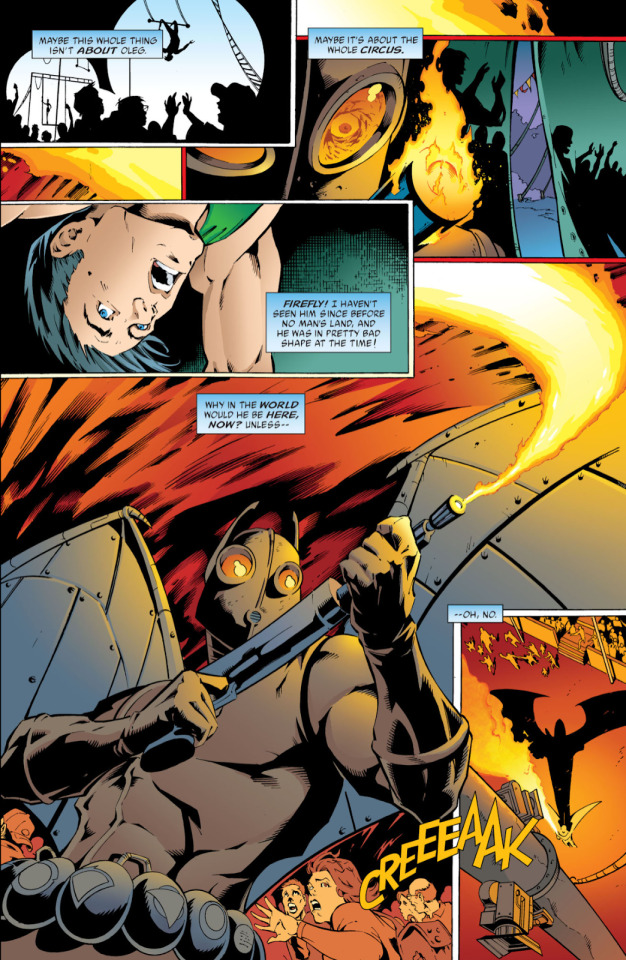
(Grayson, Devin, writer. Davis, Shane, illustrator. Flurry. Nightwing no 88, e-book ed. DC Comics, 2003. pp. 16)
While that certainly worked in breaking Dick’s spirit, it wasn’t until Dick’s building exploded that he realized this was a targeted attempt to get to him. All of those innocent people died not because Blockbuster was trying to kill Dick, but rather, because Blockbuster knew that their deaths would destroy him.
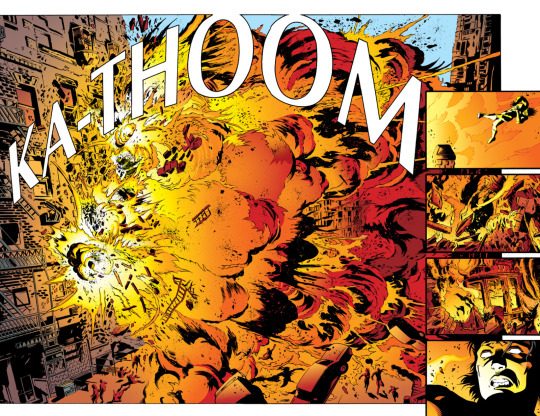
(Grayson, Devin, writer. Zircher, Patch, illustrator Avalanche. Nightwing no 89, e-book ed. DC Comics, 2004. pp. 12)
What follows is a downward spiral that demonstrates just how thoroughly Blockbuster is able to break Dick. Even as Dick gains new ground by taking out some of Blockbuster’s hired assassins, the threat still looms over him. And even when it seemed like Dick finally found a way to take down Blockbuster for good, that hope is snatched from him. The anger and helplessness Dick experiences in this moment truly speaks to the same feeling many of those who stand up against their oppressors feel whenever they are faced with setbacks in their constant battle.
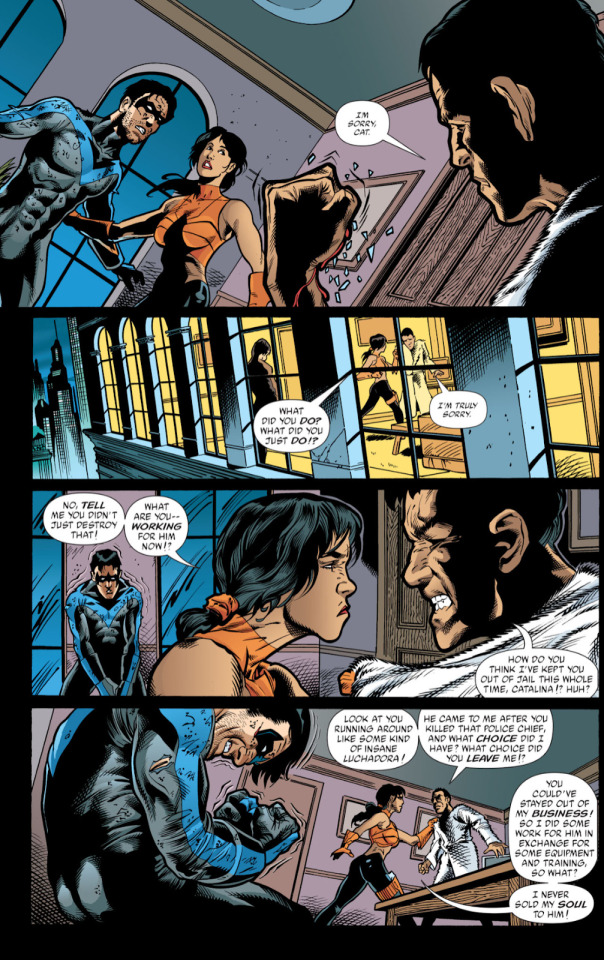
(Grayson, Devin, writer. Garcia, Manuel, illustrator Flashpoint. Nightwing no 92, e-book ed. DC Comics, 2004. pp. 21)
The carnage continues. The reporter who had uncovered Nightwing’s identity and just so happened to be standing next to Dick is mercilessly shot dead in front of Dick’s eyes.
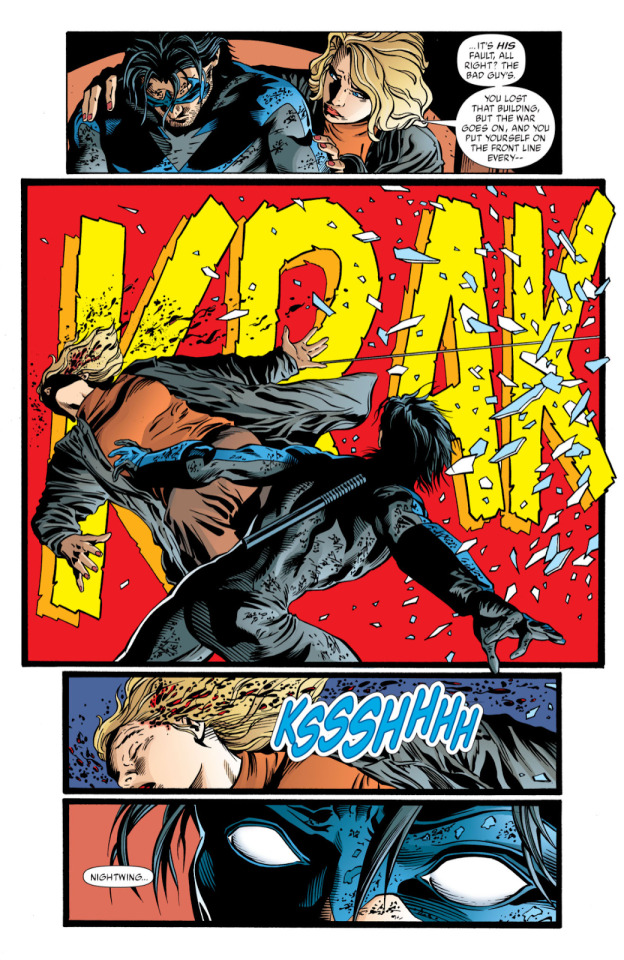
(Grayson, Devin, writer. Zircher, Patch, illustrator. Slowburn. Nightwing no 93, e-book ed. DC Comics, 2004. pp. 07)
And as Blockbuster chases Dick down, putting others in harm, we can see as Dick tries to protect innocent people around them that Blockbuster will not stop. He will not rest.
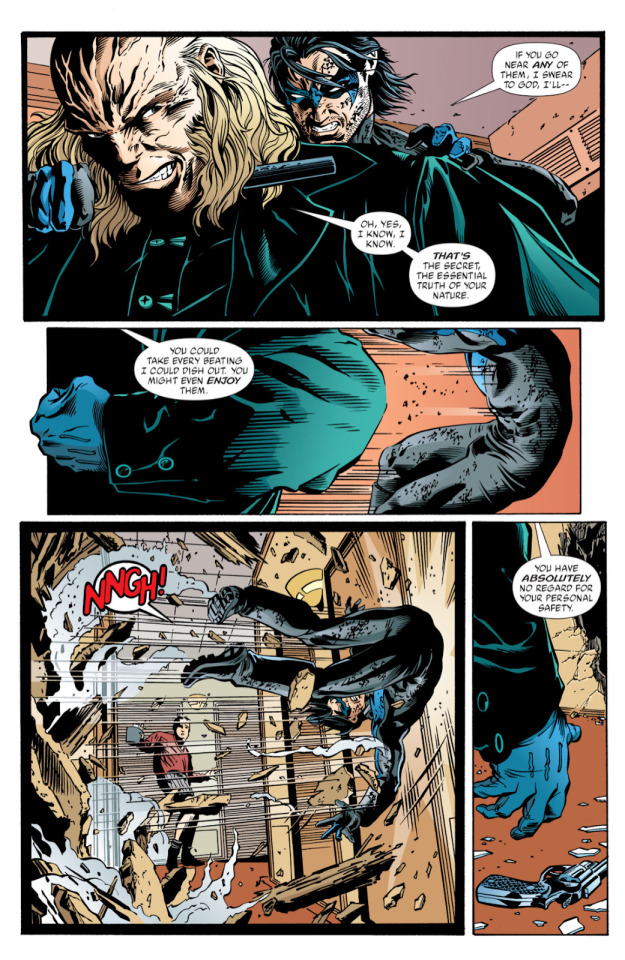
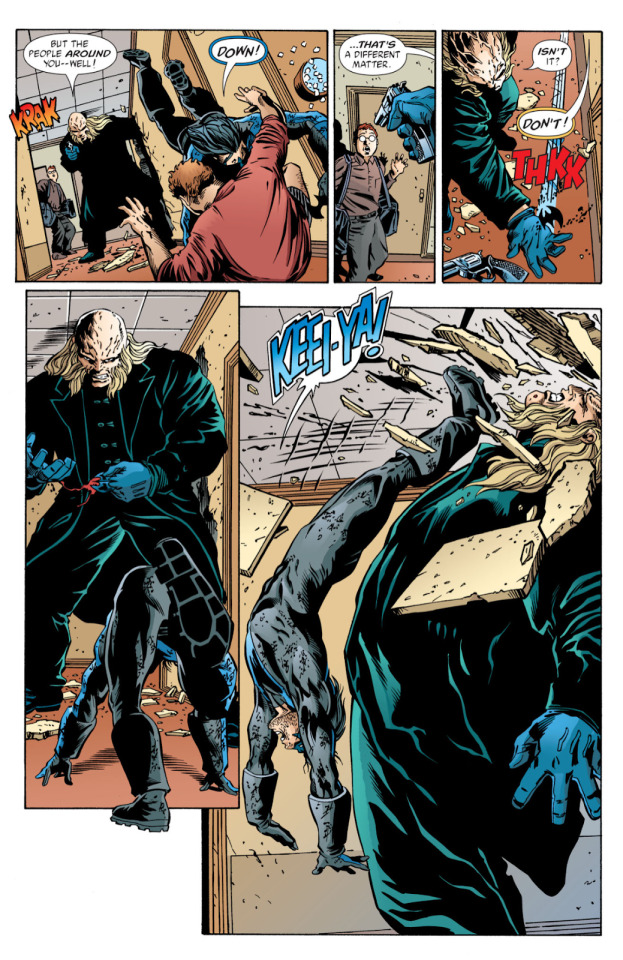
(Grayson, Devin, writer. Zircher, Patch, illustrator. Slow Burn. Nightwing no 93, e-book ed. DC Comics, 2004. pp. 10-11)
Blockbuster says it himself in a speech where he lays out exactly what his plans for Dick are. Dick is at a breaking point. The enemy, huge and impossible to overcome, towers over him. As the climax reaches its crescendo, Blockbuster asserts his power by mocking Dick and laying out a future in which Dick can never escape this hopeless terror. This city belongs to Blockbuster. Dick is powerless. There is no winning.
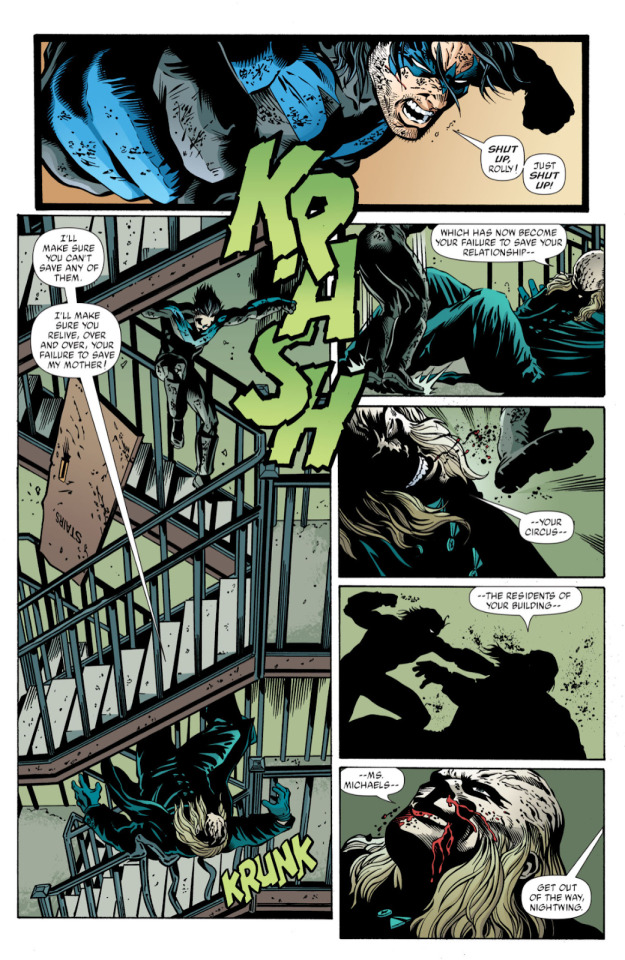
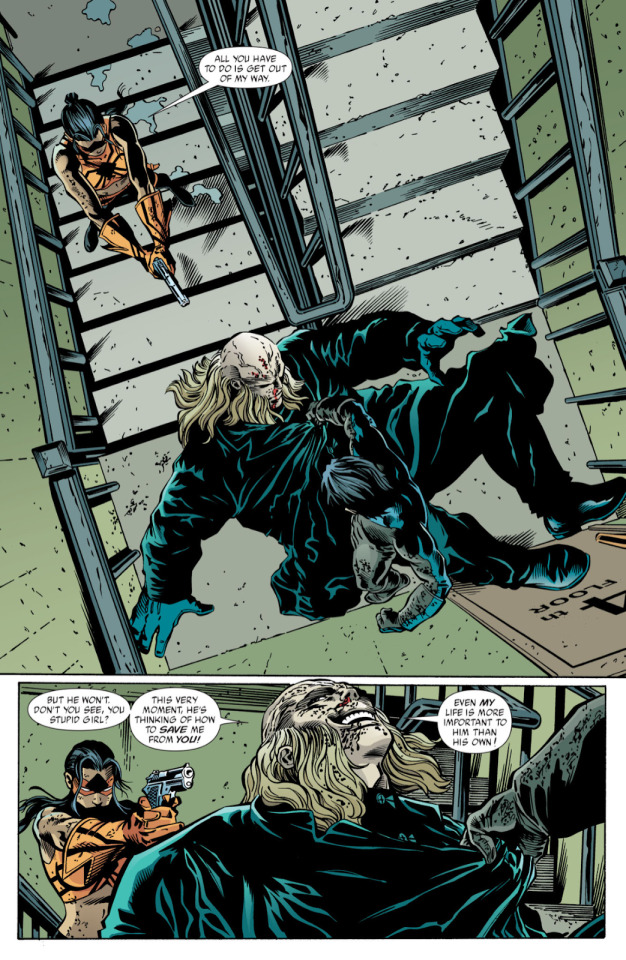
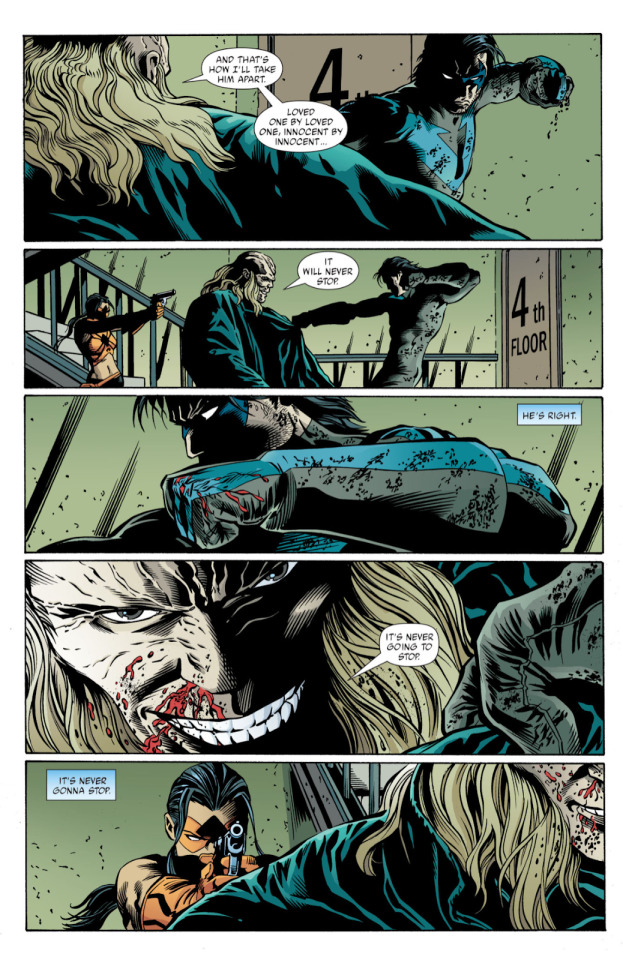
(Grayson, Devin, writer. Zircher, Patch, illustrator. Slow Burn. Nightwing no 93, e-book ed. DC Comics, 2004. pp. 13 - 15)
This speech is visceral. Personal. Evocative and filled with character and emotion. These words could not have been uttered by anyone else but Grayson’s version of Blockbuster. And they could have not been directed at anyone but Dick at this very moment. This speech has specificity that was purposefully crafted to raise the tension of this moment to its fullest potential.
By comparison, Taylor’s “I am this city” line is generic. Like much of his dialogue, it lacks character — nothing about what Blockbuster says feels distinctive to him. Nothing sets it apart from how other characters speak in Taylor’s world, and nothing about it is unique to this particular confrontation. Even the way he bangs his hands on the ground like a toddler throwing a tantrum (and resulting in Dick’s second unmasking in this run) is childish and undermines the tension of what is meant to be a climatic moment.
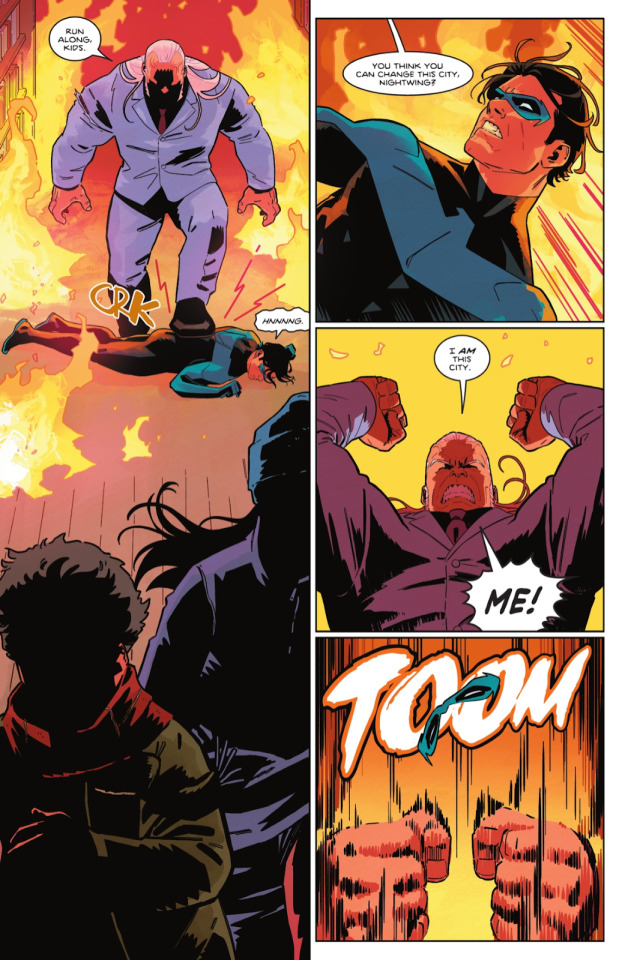
(Taylor, Tom, writer. Redondo, Bruno, illustrator. The Battle for Bludhaven’s Heart Part Four. Nightwing: Rebirth. 95, e-book ed. DC Comics, 2022. pp 20)
The themes in Grayson’s run are not the same as the themes in Taylor’s run. However, Blockbuster still invokes the threat of an oppressor. By isolating Dick from his support system, his terror and the helplessness it generates are intensified. Rather than making Dick question his own morality, he makes Dick doubt his abilities to be a hero.
While Dixon used Blockbuster’s intimidating build and power to explore the ways in which systematic corruption is responsible for the immediate evils we encounter in everyday life, Grayson used those very same characteristics to explore how one copes with being oppressed on a personal scale. Grayson’s Blockbuster pushes Dick to the darkest place he’s ever been, and the aim of her run was to see how he would be able to put himself back together again after he lost faith in his ability to make a difference.
Those two runs demonstrate how Blockbuster’s grip on power can be used to oppose Nightwing in two very different ways. Dixon’s approach requires Blockbuster to stand at a distance, the unseen machine that Dick will have to eventually destroy. This allowed Blockbuster to remain Nightwing’s main opponent for all 70 issues of Dixon’s run without ever calling into question Dick’s competence or his dedication to his mission as Blockbuster, the themes he embodied, and the struggle Dixon built clearly signaled that, no matter how great Nightwing was or how much he might wish to do so, the circumstances were not at a point where Dick could take on Blockbuster and succeed. By contrast, Grayson shifted Blockbuster from a long term, simmering threat to an immediate and personal one. This, though, also meant that the conflicts in Grayson’s run were more internal than those of Dixon’s. While Blockbuster was the enemy, the true antagonistic force that Dick would be forced to battle throughout Grayson’s run was Dick’s depression, his self-loathing, and his self-doubt. For this reason, rather than standing in the background while others did his bidding, Grayson’s run pushed Blockbuster to center stage. As he became an urgent threat who was costing people their lives every minute he roamed around free, apprehending him was no longer something Dick could afford to create a strategy around — it was something that demanded prioritization.
Nearly twenty years later, Taylor’s attempts to merge these two approaches only serves to lessen Dick’s competence and Blockbuster’s threat. Like Dixon, Taylor uses Blockbuster to represent, as it was plainly stated in his run, everything that is wrong with Bludhaven – the men in power who “have everything and still want to take more.”
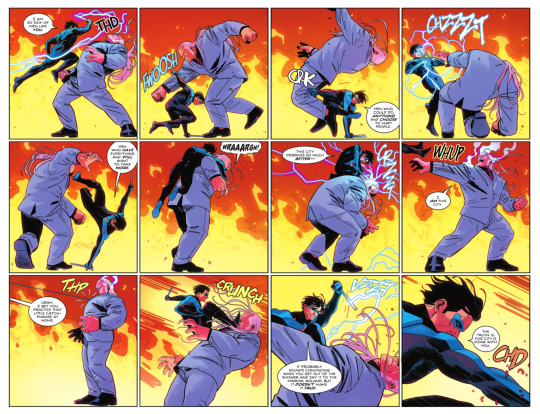
(Taylor, Tom, writer. Redondo, Bruno, illustrator. Battle for Bludhaven’s Heart Finale. Nightwing: Rebirth. 96, e-book ed. DC Comics, 2022 pp. 08)
And yet, it is Grayson’s plot beats that he copies by having Blockbuster personally target Dick in a myriad of unsuccessful ways.
While Grayson’s Blockbuster targets Haly’s Circus, Taylor’s Blockbuster targets Dick’s dog, Haly. While Grayson’s Blockbuster successfully kills Dick’s neighbors, Taylor’s Blockbuster fails to kill Dick’s neighbors thanks to Melinda and Wally’s intervention.
Because of this personal persecution, Blockbuster becomes Dick and his allies’ priority. However, because Taylor’s Blockbuster’s actions never have any negative consequences; because the humorous tone is always undermining the tension; and because the reader does not get see Dick struggle or fail against Blockbuster’s attempts the way he does in Grayson’s run, Blockbuster’s does not come across as the larger than life villain he is meant to be. Rather, his constant failures, his generic dialogue and unclear motivations, and his straightforward intimidation tactics make him more into a fumbling fool whose powerful position is incidental rather than the result of merciless oppression.
And yet, he becomes Nightwing’s priority. Thematically, Taylor’s Blockbuster is meant to imitate Dixon’s, but the narratively he acts like Grayson’s Blockbuster. This makes it so he is more of an immediate threat than Dixon’s villain, but less effective in his terror tactics than Grayson’s.
With the consequences of Blockbuster’s crimes being non-existent plot-wise, the stakes of the plot are never elevated. Blockbuster’s threat remains abstract because in Taylor’s run, everyone who is not an explicit bad guy has plot armor so thick that they cannot be forced into an uncomfortable on-screen situation for more than two or three pages at a time.
The clashing of theme and plot create enough of a dissonance as it is, but the presence of Heartless, who is actively and brutally murdering people and leaving children orphan, only deepens the problem. Heartless’ gory crimes not only overshadow Blockbuster’s failed assassination attempts, but the sheer amount of people who have fallen victim to his deeds creates an urgency and a tension that demands to be resolved.
Though Dick is aware of Heartless' existence, he does not make the serial killer his priority. When Grayson made Blockbuster’s threat more immediate and Dick became aware of the rising body count, stopping Blockbuster became his sole focus, to the detriment of his own health. Dick’s obsession with catching Blockbuster at all costs helped add to that intimidating aura around him.
Humphries understood this when crafting the dynamic between Dick and the Judge in The Untouchable. Heroes and their villains have a symbiotic relationship. When the Judge kills people in brutal ways, Dick jumps into action and stops at nothing until he catches him. This shows the audience that the Judge is a threat to be taken seriously, and it shows Dick to be a hero who will always put others first. When Dick fails to take the same approach with Heartless and instead focuses on Blockbuster, Dick comes across as an incompetent and self-centered.
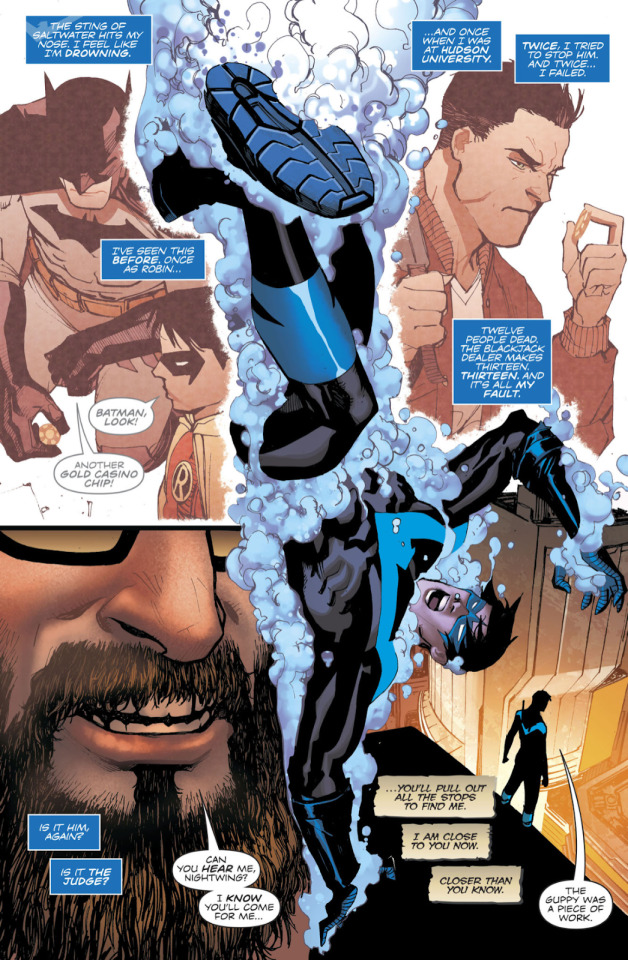
(Humphries, Sam, writer. Chang, Bernard, illustrator. The Untouchable: Chapter One: Hunter. Nightwing: Rebirth no. 35, e-book ed. DC Comics, 2018 pp. 20)
At this point, one might be wondering why high stake conflicts and ruthless villains are even needed in a Nightwing comic. I have seen many people defend Taylor’s writing by claiming that they enjoy the fact that it has no tension. They like the easiness of it, the slice-of-life nature of his storytelling. And while even his slice-of-life writing is not really my cup-of-tea, I can understand this sentiment. Taylor seems to truly enjoy writing the more sitcom-aspects of Dick and Babs’ life together. It is not the fights, the mystery, the intrigues, the nuances of living a double life that interest him — it’s the taking care of the rescue puppy, the sharing of a pizza in the park, the two childhood friends finally getting to live an idealistic millennial adult life together without having to worry about everyday problems like work, rent, family troubles, or disagreements. He thrives when writing stories that remain static, with simple episodic plots that never truly lead to character development or a change in the status-quo. He excels in quippy yet straight-forward dialogue where things don’t need to be taken seriously.
And to be clear, I don’t think that is a bad thing. I don’t think slice-of-life or sitcoms are a lesser art form than dramas or action series. Like many people, I too, have been comforted by that type of entertainment. I, too, find escape in those sorts of stories. I daydreamed about a life where I could just enjoy time with my friends without thinking about work, where the worst problem I face is how to avoid going to a party without appearing rude. Those stories have value, they have their place in our culture… But Nightwing's solo series is not that place.
Now, this will probably be the one of the most controversial things I will say in this entire essay, but despite my love for Nightwing, I do not believe that the Nightwing mantle is Dick’s ultimate true form.
In DC Secret Files: Nightwing Secret Files #1, Dixon explores the aftermath of Dick being fired as Robin by having Dick confess, with a certain amount of shame, that he always thought that he would eventually become Batman. Bruce understood that and he was preparing Dick to be his successor. Losing Robin, then, means losing any certainty Dick has for his future. Suddenly, he is adrift, not only having lost Robin, but also Batman. And that’s when Clark tells him the story of Nightwing.
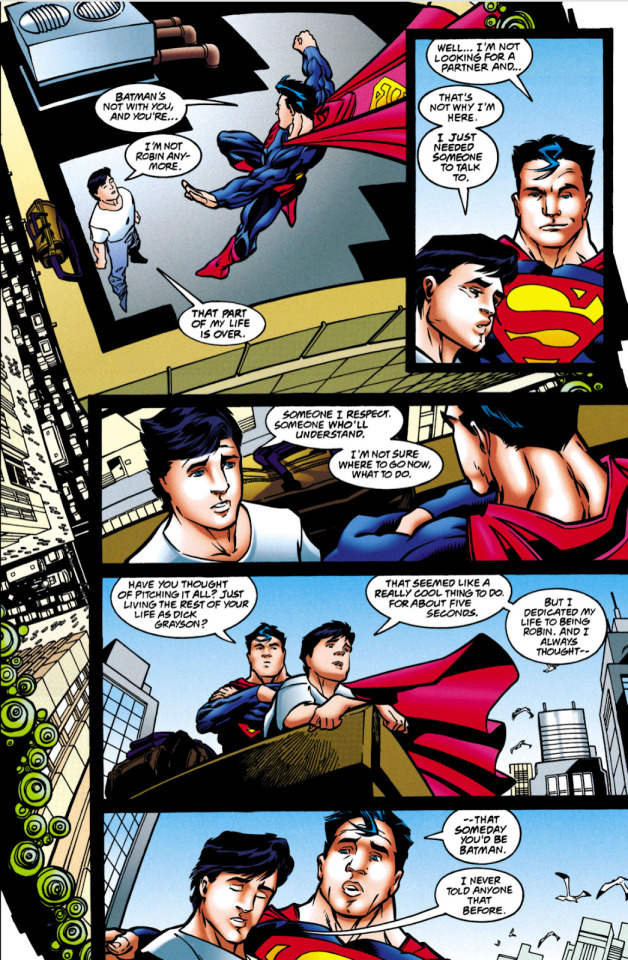
(Dixon, Chuck; Grayson, Devin; Peterson, Scott; writers. Ha, Gene; Scott, Damion; Land, Greg; Stelfreeze, Brian; Guice, Jackson; Eaglesham, Dale; Floyd, John; Jimenez, Phil; Brown, Eliot R.; McDaniel, Scott; Nolan, Graham; Rosado, William; Kuhn, Andy, illustrators. DC Secret Files: Nightwing Secret Files #1. DC Secret Files: Nightwing Secret Files #1 no. 01, e-book ed. DC Comics, 1999. pp 15)
Personally, I think there’s something really special about that idea. The Nightwing story grounded Dick during one of the most uncertain times in his life. Dick wanted Robin and Batman, but once both were taken from him, he created Nightwing as a way of coping with the trauma of having his identity, future, and certainty taken from him.
Braxi concludes his essay On Superman, Shootings, and the Reality of Superheroes by saying that “I don’t need Batman to end homelessness. I need Batman and Superman to provide moral and spiritual guidance to show us a better world is possible. I read Batman to transform trauma into will power.” (Braxi, Steve, “On Superman, Shootings, and the Reality of Superheroes” Comics Bookcase, September 2021)
The same, I believe, is true for Dick. As the character created to accompany Bruce and mirror him in as many regards as he foils him, Dick transforms trauma into power. He makes his own suffering a source of good.
As I said, I do not believe Nightwing to be Dick’s ultimate, truest form. I believe that to claim that Dick’s only happy ending is to have him be Nightwing not only diminishes the importance that Robin and Batman played in his life, but it also undermines what is so unique about Nightwing as a mantle.
Dick loves being Nightwing. Nightwing is an extension of who he is. But Nightwing is not the only happy ending Dick could have had, and to treat Nightwing as inevitable is to ignore the fact that Nightwing was born out of a trauma and a loss that could have been prevented had the circumstances that led to Dick losing Robin been different. Nightwing means transformation. He means change. Nightwing is a phoenix-like Kryptonian myth, raising himself from the ashes. But for the ashes to exist, a deadly fire must first occur. Nightwing, this great hero of light, can only be born out of pain. He can only arise from conflict.
This is one of the things that makes Dick so special. When he is overpowered, he does not give up. When he is hurt, he transforms that pain into power. No matter how many times he loses, no matter how many times he is lost, he always rises again, with a beautiful smile and an unwavering kindness that inspires others — including Superman, especially Batman — to do the same.
That is why a Nightwing story needs conflict. This is why he needs ruthless villains. That’s why a Nightwing story needs the occasional failure. Because it is only when we see Dick at his lowest that we also get to see him overcoming darkness, showing why he is the best of the best and why we love him so much.
31 notes
·
View notes
Text
we watched the famous much ado about nothing in preparation for macbeth, and the thing is... ive never seen it before (this iteration, i have seen other much ados...)
for some reason, for the longest time, until now, i kept waiting until the "right" moment, feeling like i'd know when it was and finally, at last, the moment has happened, and i have watched david tennant and catherine tate playing benedick and beatrice, and truly it was absolutely beautiful bisexuality in action the entire way through -- and the way this play balanced comedy and drama was fantastic. we've watched josie rourke's direction before and she's so pinpoint
the part where we go from the heartbreak of the wedding, to a hilarious love confession between benedick and beatrice to an incredibly intense demand that benedick kill claudio, and it's all sooooo alive! that's the thing about shakespeare, especially if you're trying to get in an audience who isn't so used to it, you need to get out of the stuffiness and yeah, certain lines won't be understood by all the audience, but they'll understand the beats if you map out those beats clearly, which is exactly what this one did with its Big comedy and Big drama -- not saying every production wants or needs that, but with these two actors it was the exact right choice
I think that catherine tate and dt nailed those shifts the best (of course they also have the most to work with) but most everyone got to have some of these beats for themselves. fascinated by their don john, who seemed to have a lot less power than other versions I've seen of this play, and also dogberry, whom I uuuusually don't get so much out of, but really enjoyed him this time (it's not a falstaff situation, where I've hated 99% of falstaffs -- although I note josie rourke is also the person who directed the henry iv with a falstaff i liked. her and gus van sant), and also gave claudio and hero some feeling of being a bit more alive and grappling with their various kinds of emotions throughout, where often they end up just being "sweet bland girl and dick who was easily manipulated" in my head
#ohhh the part near the end with the beach chairs is so tender and lovely and serious and funny all at once#it's like it took some of the play's bigger shifting scenes and gave us a quieter version of them#in which they both know and we know and so it's just about the intimacy of the two of them#much ado about nothing#im watching movies#im watching much ado about nothing#david tennant#catherine tate#really really hope to catch ct in london
22 notes
·
View notes
Text
The connection between Izzy and Buttons in S2
Guys, I just realised something about the connection between Izzy and Buttons that could actually explain why Izzy had to die in a way that affirms the show's internal logic instead of actively contradicting it.
So, OFMD has always had a very... interesting relationship with reality. On the surface, it *is* based in reality, of course. As intentionally historically inaccurate as it is, it's still based in real life history. It's not fantasy. And yet, it's always lived in that weird liminal space between reality and fantasy. I would argue that a liberal use of huge intentional anachronisms such as singing a 20th century song in an 18th century show counts as a fantasy element. And death being treated as essentially nonexistent for characters who aren't villains, to the point where it deliberately makes fun of all real life biology and physics laws to make the characters practically unkillable so physical threats can safely be used for non-lethal drama or comedy, that's also a fantasy element. Even things like dream sequences and hallucinations (both ghosts and near death experiences) can also be said to blur the lines between reality and fantasy.
Still, in S1 all of those elements were still used in a way that had plausible deniability. Was it in any way realistic that a character could recreationally stab himself in the guts dozens of times and apparently it was totally safe and risk-free and resulted in nothing more than a scratch as long as you kept to the left side? Of course not. But it's possible to ignore it and let it slide if you try hard enough. It's still not a tangible proof of anything magical.
But what happens in S2? A man turns into a bird. Literally. This could easily have been left intentionally ambiguous, but it wasn't. It happened for real. Buttons got a book of transmogrification, found the right vessel, and bam. He's a seagull now. The first real, tangible act of magic in the book.
Narratively, the purpose of that moment was to make Ed believe that people are capable of change. Including himself. And it doesn't seem like there's anything more to it. But what does this actually mean for the internal logic of the show? It upsets the balance. A show that only had a certain level of subtle magical realism suddenly got a very tangible act of magic. What if OFMD world works just like any typical fantasy world? Meaning that there is such a thing as a certain balance that has to be maintained. So if Buttons got some "extra magic"... This meant that an equal amount of magic had to be taken away from somewhere else, in order to balance out the scales.
Now, who could be said to have an extraordinary amount of OFMD magic this season? None other than Izzy hands. The guy survived not one, not two, but THREE "fake death" experiences. He was now officially part of the unkillable Muppet cast. He even managed to utilise his new wooden leg - which, while adorable and maybe well made, is surely not very well ergonomically suited to replace a real leg - and regain his swordsmanship skills, and by episode 8 he barely had a limp anymore. And wasn't his performance just pure magic? Not just the massive anachronism but the way he had it in himself to sing a song like that in the first place, dressed in beautiful drag? The way he seemed to have such a massive amount of perfect character growth in such a short amount of time?
Well, this is what I'm saying: Izzy had to die as a consequence of Buttons becoming a bird. Izzy was the character whose OFMD magic got taken away to compensate. He lost the absurdist comedy style OFMD armour that he and every other character had this season. So of course he got killed by some stupid stray bullet that injured him offscreen, the way you'd see happen in real life, or in "serious" shows like Black Sails or Game of Thrones. And in his left side, to boot. Because the magic no longer applies. Of course getting shot in the left side of your stomach would be just about as lethal on average. And that's how we got that completely serious and dramatic deathbed scene too. Because that's what happens in real life or "realistic" TV shows. That's what happens when that little bit of subtle magic is lost.
31 notes
·
View notes
Text
Roze episode 3 thoughts
Didn't get around to putting my thoughts on episode 2 down last week but basically Ash Phoenix is easily becoming my favorite character in the cast and also catherine is a little funny i think
Anyways as usual below this line will be spoiler talk
Ok so like episode 3 had a lot going on like WOW. LL's new fit looks better in the scene that he shows up in than the concept art ive seen floating around. I have seen some discussions on the lore discrepancies regarding lelouch bestowing the same geass he had onto sakuya/roze however i'll wait and see how things go before i decide my thoughts on that bit. I think throwing a fit over lore contradictions is a bit silly, personally.
The maid cafe section of the episode really brought back the goofy slice of life elements of code geass that you either dread or cherish. For me personally even if a lot of it leans onto fanservice I feel like the more comedic lighthearted moments are necessary to emphasize the drama that happens later. Having Sakuya be forced to balance working at a cafe and also larping as Ash's brother while also having to deal with Ash crushing on her waitress-sona is an entertaining scenario. Although not as layered as the school shenanigans in og Code Geass, they can definitely work with this for 12 episodes i feel. or 4 movies, depending on how you're viewing this.
Ash Phoenix. This character fucking baffles me, dude spends one episode cooking with the hardest one liners possible ("I'll show you that even iron bleeds" is the hardest shit like dude) and then goes into the next episode bumbling and infodumping over a crush. He's perhaps the most endearing character on the cast in my opinion, he's just a silly little guy who loves taking care of puppies and kittens and he loves cooking however he also is highly trained in military combat and has nearly inhuman reflexes (dude moved that coffee cup filled to the brim with coffee at high speeds and somehow DIDNT spill it) like he's just the funniest guy there at this point.
Catherine is another highlight this episode, she appeared with one big scene involving her but I already am enjoying how extra she is. She is like intentionally leaning in to the whole meangirl shtick and yknow what? i think its entertaining as shit personally speaking. like yeah shes a total asshole, everybody in neo britannia is. but that doesnt stop the fact that she is incredibly fucking silly to witness. like one of those characters that you love to shove down a flight of stairs.
Norland had his first speaking role here, I was completely caught off guard hearing Dan fucking Green voicing him. It genuinely took my some time to recognize his voice in the dub but shit man his voice was scary here. I was worried that neo britannia might just be a bit of a pushover going off of how the fights with arnold and the two other guys went, but if anything this episode makes it clear that from this point on, things will only get harder for the protagonists. I hope Norland leaves a lasting impact as what i assume is the main antagonist here.
Callis caught me off guard. His dynamic with Natalia was interesting however I did not expect them to kill him off instantly. Curious as to if this was an inside job or not, either way I expect there to be some moral opposition between Natalia and Sakuya because of this incident, even if Sakuya herself has nothing to do with it.
Also taking another moment to mention Mei because I feel like she's decent comic relief. Her shenanigans when helping Sakuya come up with a fake background for herself at the cafe were really funny to watch.
But yeah, i definitely enjoyed this one more than last week's episode, not that episode 2 was bad or anything I just thing that this one kinda topped it in terms of goofy comedy and also world and character building. I'm really glad the writers managed to recapture that same feel of the original series.
#code geass#code geass roze of the recapture#code geass z of the recapture#roze of the recapture#roze phoenix#ash phoenix#sakuya sumeragi#lelouch vi britannia
16 notes
·
View notes
Text
The other manga I've been keeping up with that recently just ended! And I'm going to talk about it!
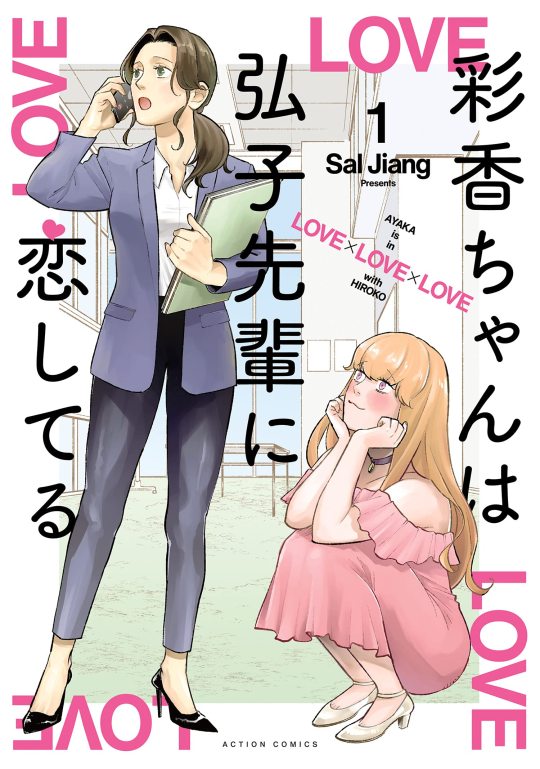
Ayaka-chan wa Hiroko-senpai ni Koishiteru (Ayaka is in Love with Hiroko!) by Sal Jiang
A lesbian office drama written by a Twitter artist I really like! Ayaka has a crush on her senior at work, Hiroko, and constantly tries to make Hiroko notice her. Hiroko is a lesbian who’s closeted at work and trying her hardest not to fall for Ayaka, who she thinks is an oblivious straight girl. The appeal is the comedy of watching two women made stupid by love freak out over each other, underlined by queer angst.
Things I like about it:
Charming characters! The main couple is SO easy to fall in love with and root for- they are so earnest and funny and have great chemistry. It also doesn’t hurt that they’re drawn REALLY well with fun, expressive faces and cute designs.
Themes of queerness as identity and community! More in the spoiler section, but my favorite scenes in this story take place in in a gay bar with a character’s WLW friendgroup as they talk about being gay. The community is my favorite part of being queer and I never see it reflected in manga, and I love how much fun and love is put into the scenes with the friendgroup.
You can read the official English comic online here! I think this is the most affordable I’ve ever seen a manga actually, so it’s definitely worth a buy! I will admit I am using the Dynasty Scans pages in the spoiler section of this post, since that’s the version I read before finding out about the official English version.
Expanding on my two points above in the spoilers section!
Time for the section where I play show and tell
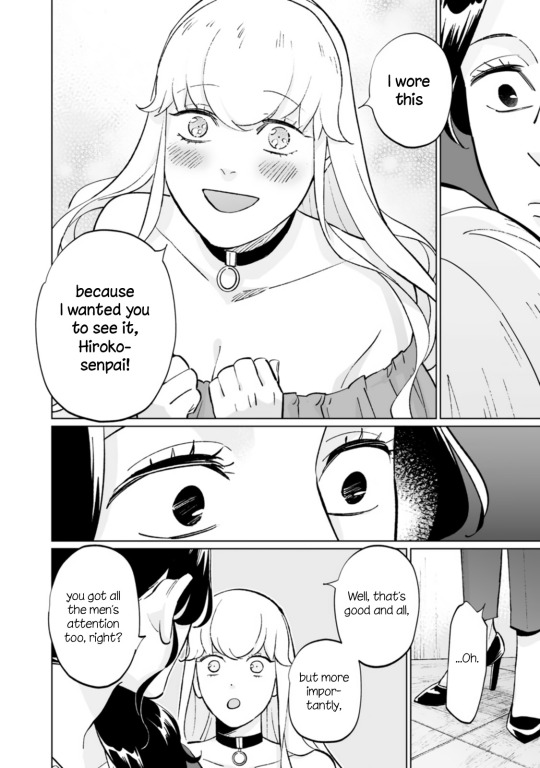
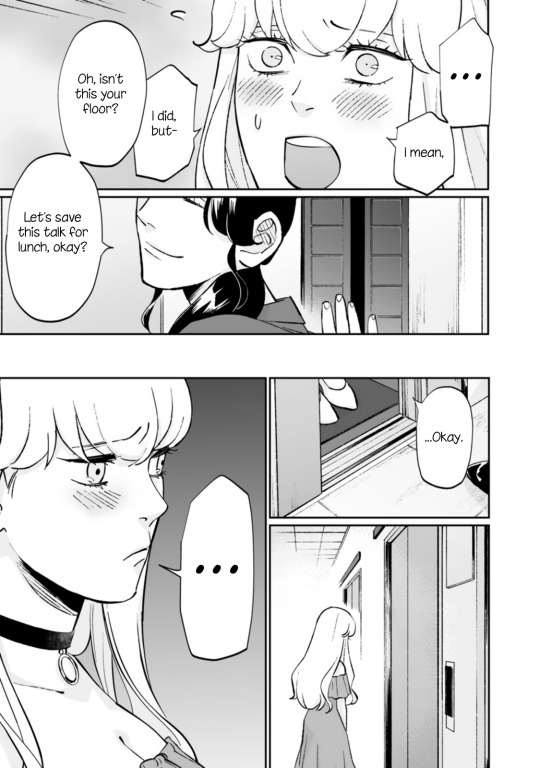
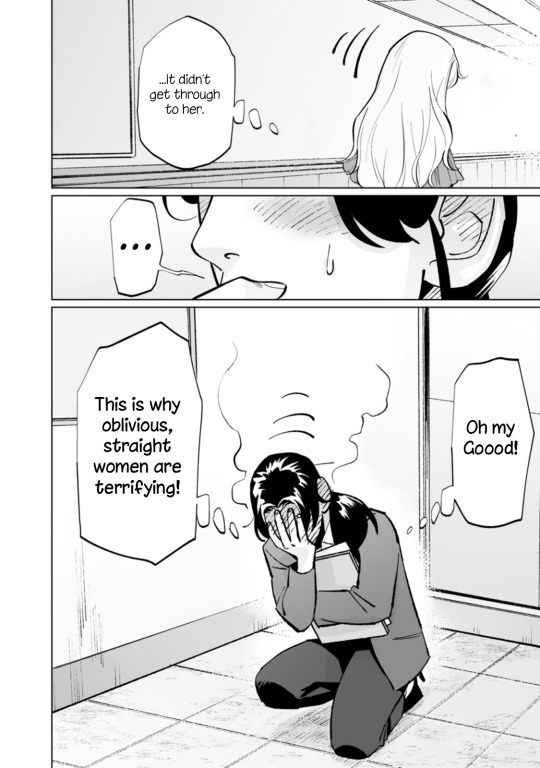
That’s the premise!
Great characters and chemistry
Ayaka is SO cute. I love pretty femme girls who are kind of bratty, and she’s portrayed in a way where you know the author’s having so much fun with her.
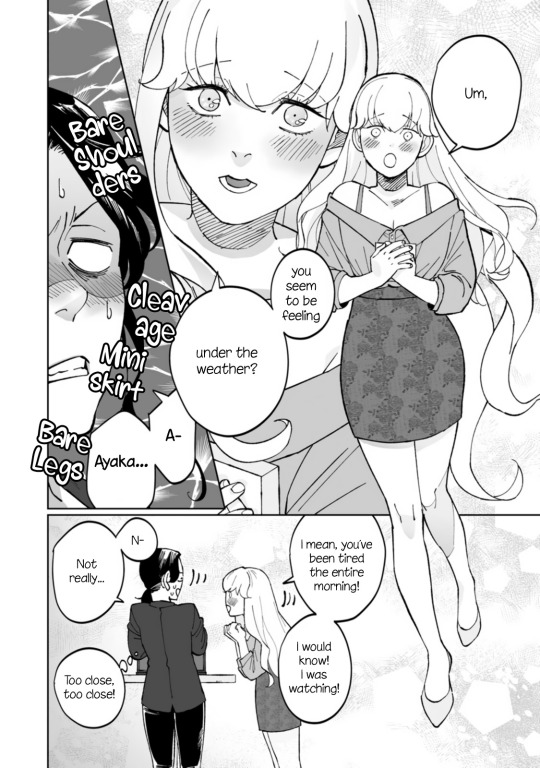
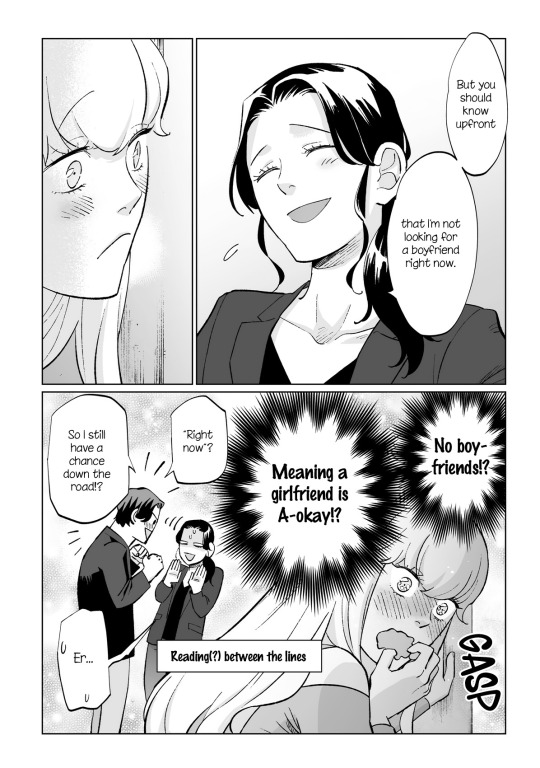
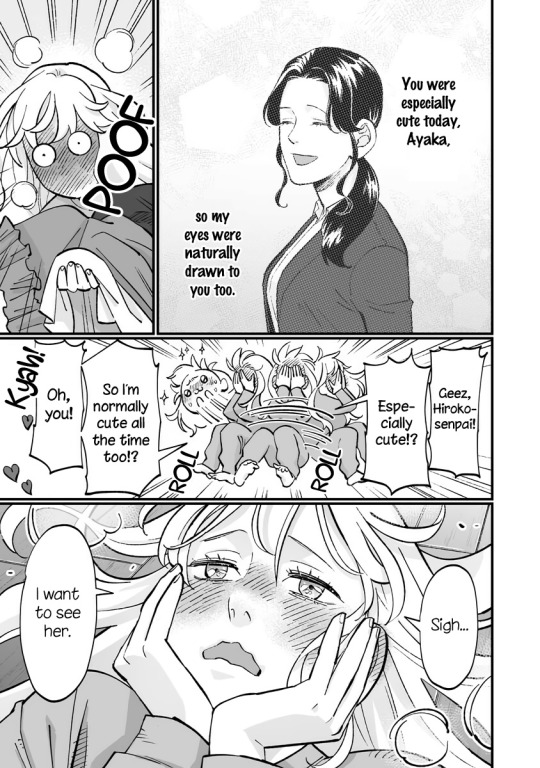
Some random out of order/context Ayaka faces from the earlier chapters! I forgot how cute and sweet she comes off in the earlier chapters, she’s a total goblin later lol
Hiroko is also such a fun character! I love the contrast between a really serious, straight laced, determined-to-not-fall-in-love person at work to uhhhhh womanizer at night lol.
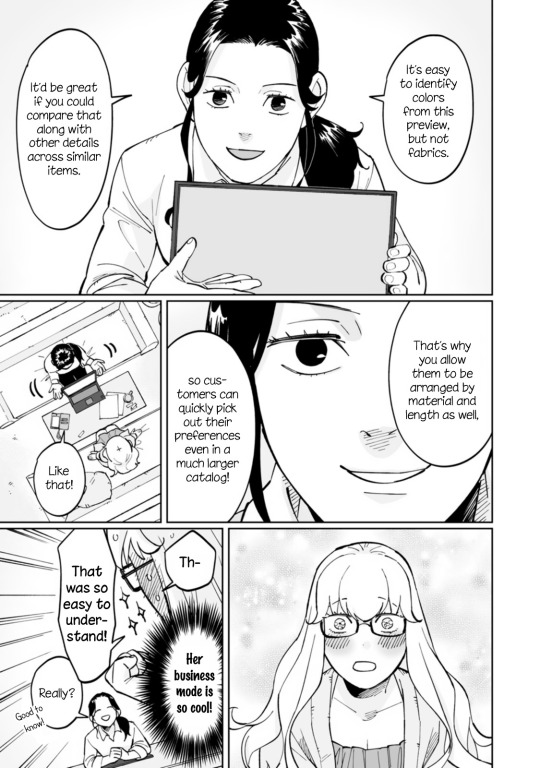
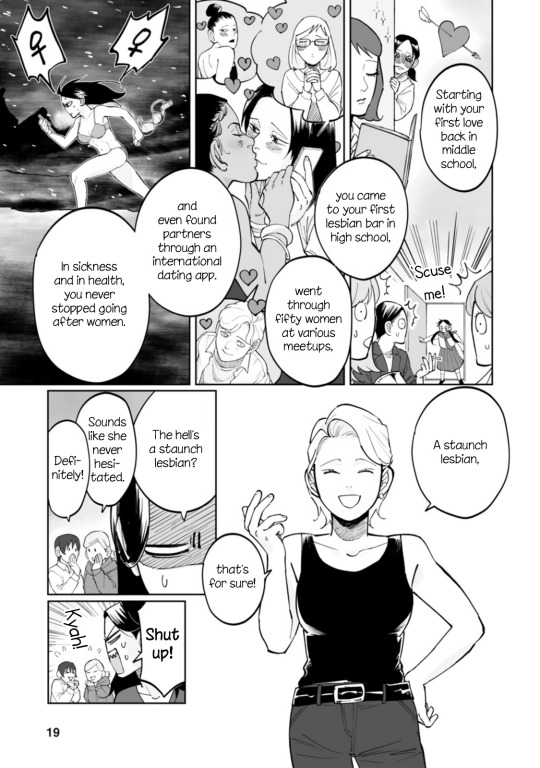
Speaking of fun, a character interaction trope I’ll never get tired of are “characters who comedically overreact when they’re in love with someone” and that fits this couple to a T!
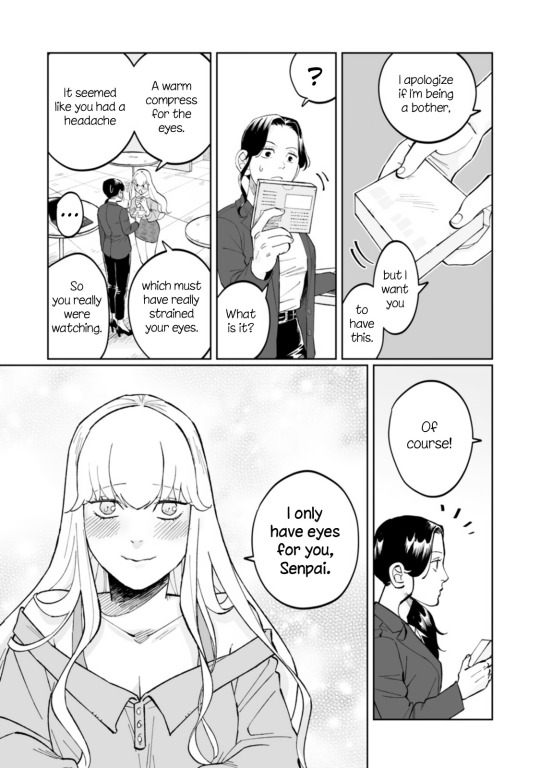
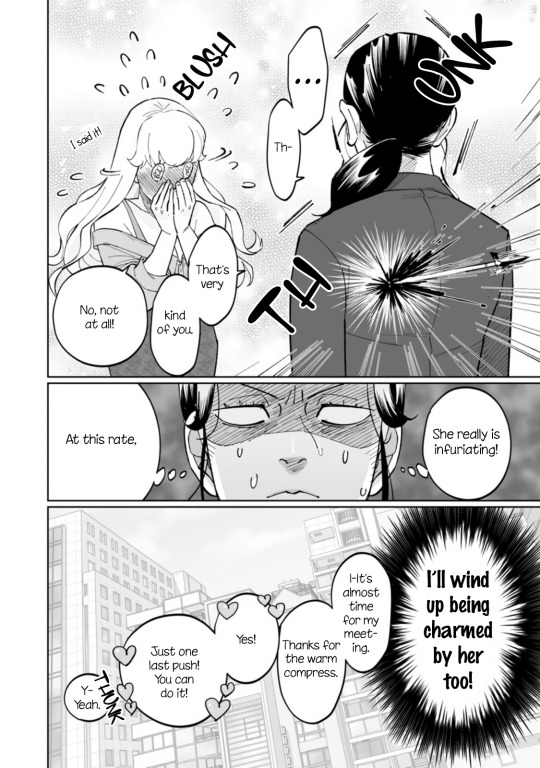
What a cute sequence….
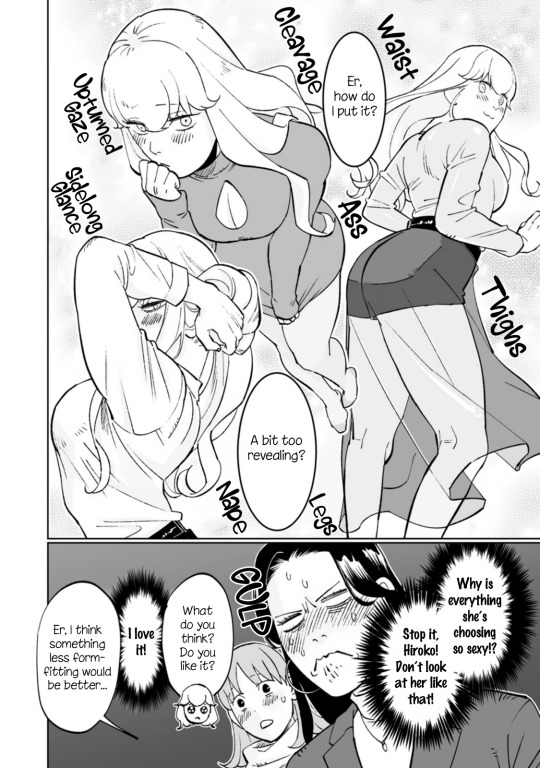
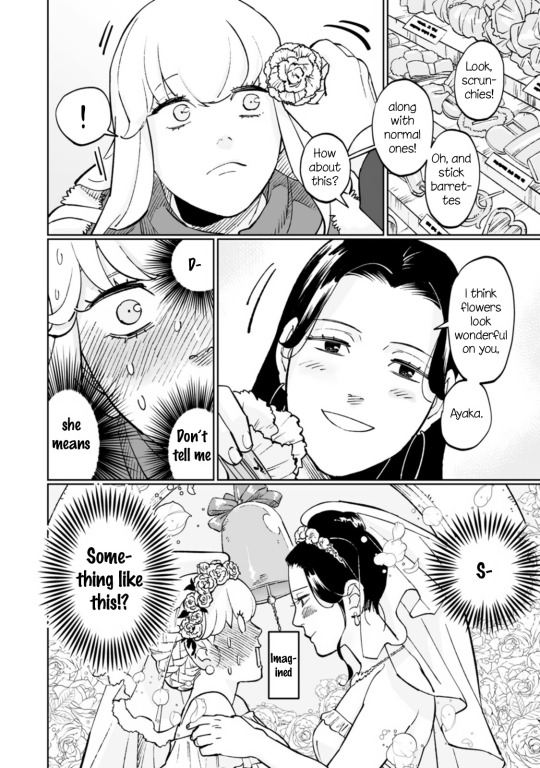
Both characters’ POVs from the same chapter. Hiroko focusing on how hot Ayaka is, and Ayaka imagining wedding bells when Hiroko looks at her LOL.
I could keep showing screenshots of these two until I basically go through the entire comic lol.
But even outside the main two, I really like the side characters as well! A standout is Risa - Ayaka’s colleague who’s also a baby gay and has a crush on her. I’m unusual in that I usually like love triangles, but I do think this one is written really well! She’s sympathetic, her doomed longing for Ayaka is delicious and relatable. (Spoilers) I love how her selfishness and selflessness is balanced- her crush and competition with Hiroko makes her sabotage Ayaka’s crush in small ways in the beginning, but she fundamentally cares for her friend and roots for them in the end. Also, (BIG SPOILERS) she and Ayaka end up dating and breaking up but still remain friends, which is another favorite trope of mine. (HUGE SPOILERS) I love this page, any manga that includes a scene like this is top tier for me…. She feels realistic and her story is really sweet!
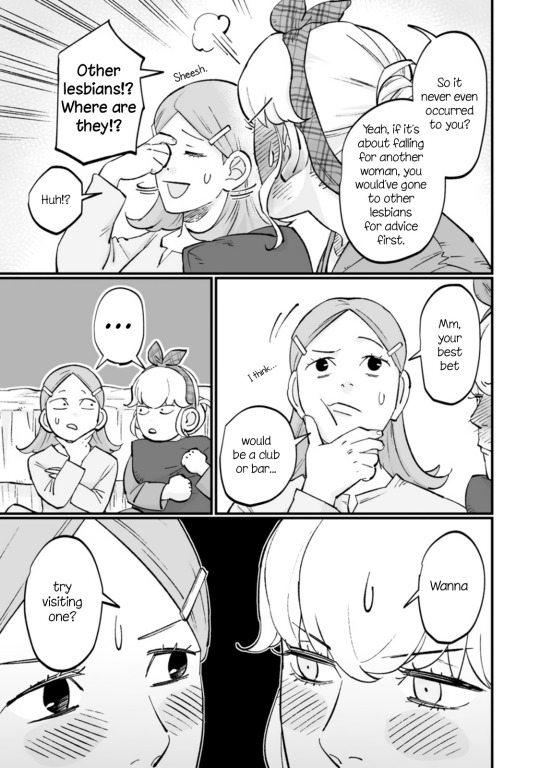
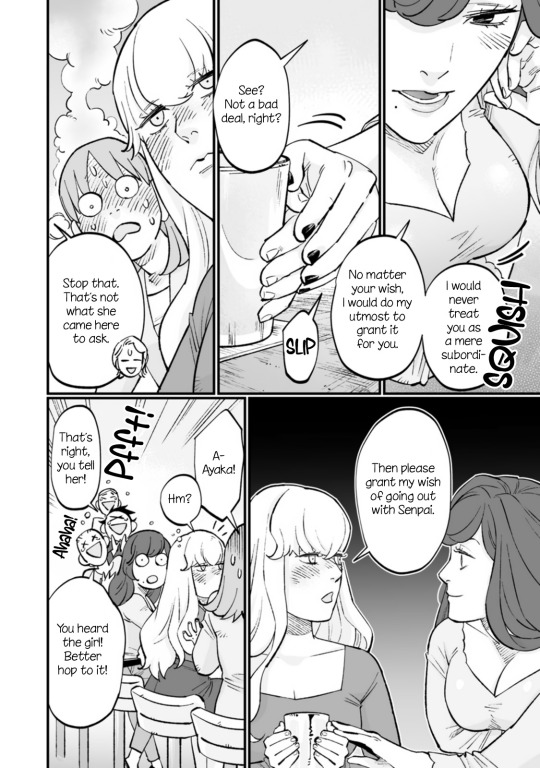
(Left) Baby gays smashing braincells against each other and (Right) Risa’s eyes wander….
Queer community and identity
This section has more spoilers than the last one!! If you haven’t read this comic but plan on it, I recommend you not read this part!!
In my last post, I said that Yuri as a genre doesn’t need to have anything about queerness as an identity to be good, but then I realized that most of my favorites did have a focus on identity…. Yeah IDK what to say LOL. But the identity aspect is a big plot point/theme of this story, and it’s written SUPER well.
First of all- Hiroko’s backstory centers on homophobia and her being super closeted at her workplace. I’m iffy on homophobia stories (just cause I’ve read a lot of them and they tend to hit on the same points), but the homophobia theme leads to one of my fav scenes:
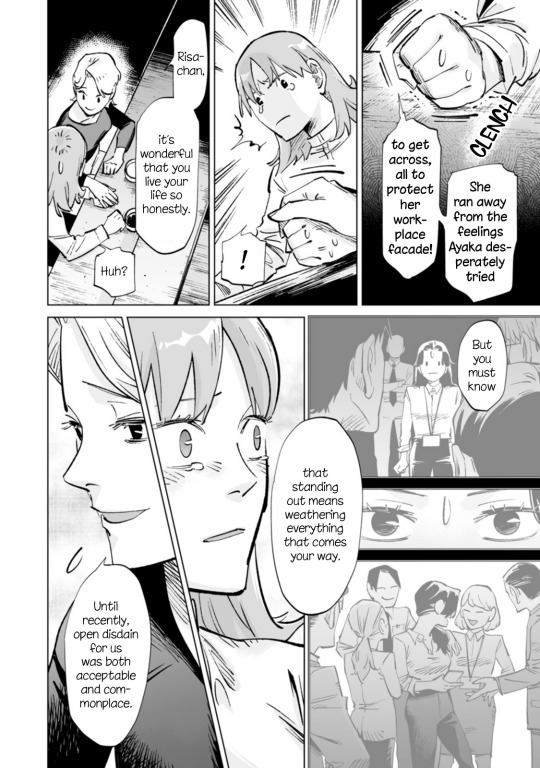
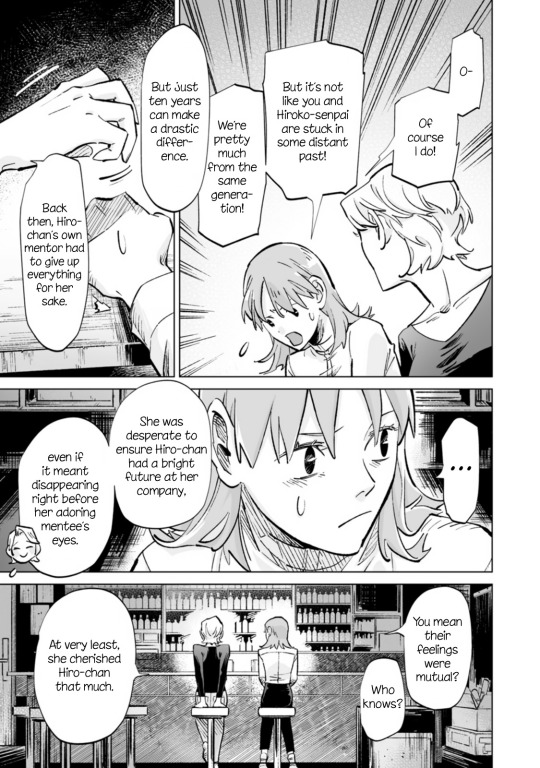
Context: Risa knows Hiroko is closeted and rants about it to the bartender at a lesbian bar who knows Hiroko.
I love this focus on how queer people interact with the straight world, and the generational divide between older and younger queers. I can only speak from a US perspective, but progress around LGBTQ acceptance has come so far and so fast the past few years that if I was born a few years earlier or a few years later, I’d have a radically different life experience. It’s something I think about a lot when reading memoirs and articles by older queer people, and contrasting that with my life and the observed lives of people younger than me online. This theme is explored well in this story- the cultural tensions between Hiroko and Ayaka and Risa, how straight people may react more positively to queer people now but it’s still not perfect, and how Hiroko has changed her workplace for the better.
Also speaking of the lesbian bar- I love the girls at the bar lol. Right after the scene with Risa, a gaggle of lesbians come in and comfort her and it’s SOOOO heartwarming and cute. I love how this friendgroup is written- supportive, but also will call you out.
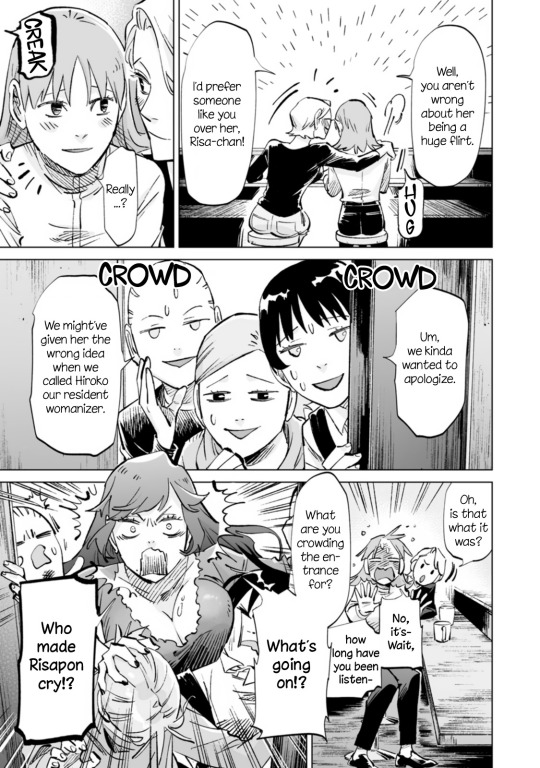
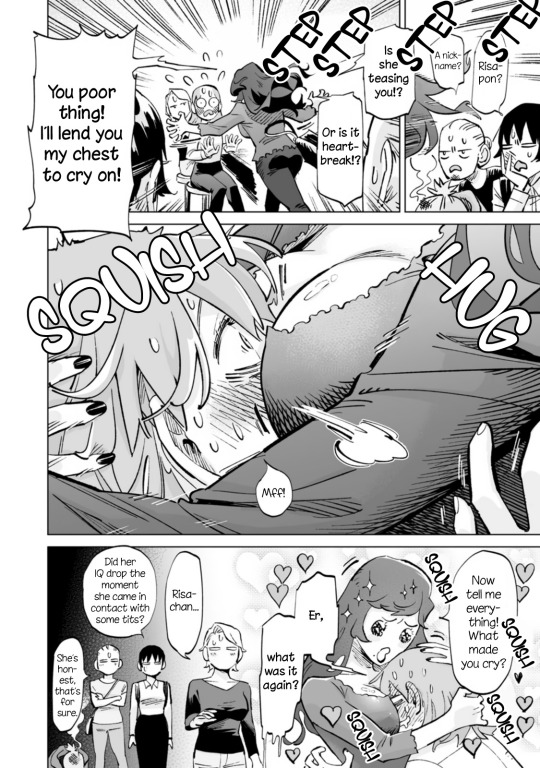
It’s so fun to read these guys gossip, give each other relationship advice, bicker with each other, and be horny at women together.
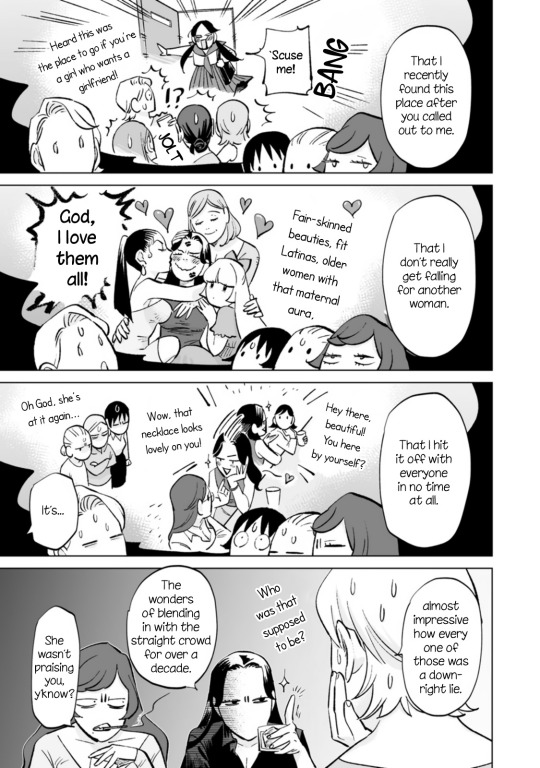
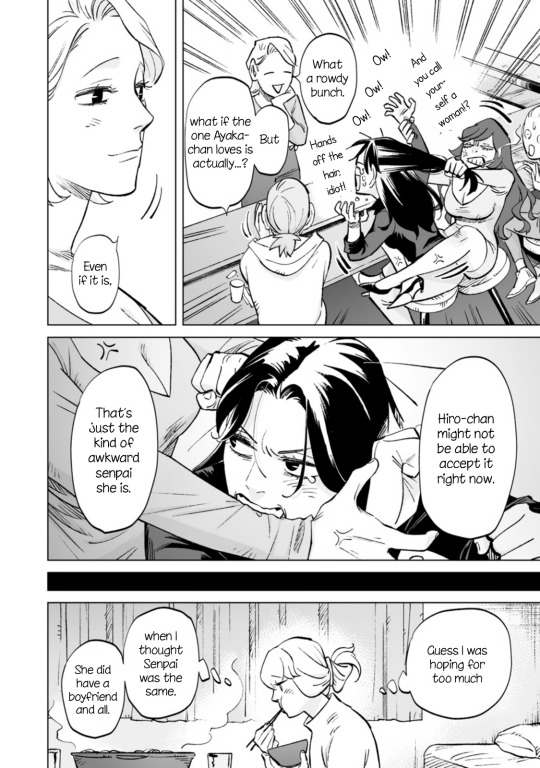
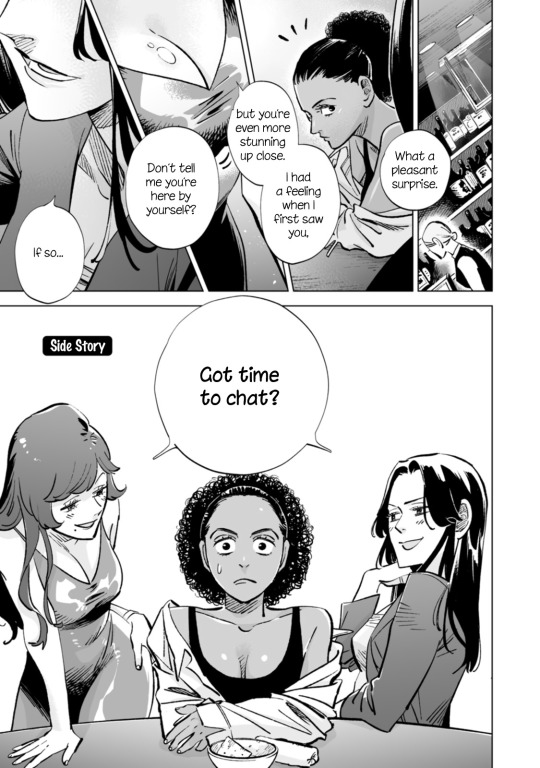
Hiroko’s relationship with the girls is more bickering, but Risa and Ayaka end up going to them for advice a lot which is so sweet and the elder/baby queer relationship I need (not portrayed because I can’t find a screenshot that doesn’t reveal a big plot twist)
Anyway…that’s it…. If you’ve read this comic please talk to me about it…if you haven’t please read it. Thank you.
#personal#manga recommendation#yuri#Ayaka-chan wa Hiroko-senpai ni Koishiteru#Ayaka is in Love with Hiroko!
31 notes
·
View notes
Text
Audio Drama Recs for Buffyverse Fans
Hey there, dear listeners! Are you a Buffy fan who’s been listening to Slayers and it’s got you interested in learning more about this whole audio drama malarkey? Are you a Buffy fan who’s not been listening to Slayers but are always interested in recommendations for new media to check out? Are you maybe even a Buffy fan who’s already listened to some audio dramas but want some ideas for others to check out? If the answer to any of these questions is yes, then this is the list for you!
The world of audio drama is a weird and wonderful place where niche independent art can flourish. If you look close enough, there’s something there for everyone! It’s my hope that the release of Slayers can help bring this wonderful medium to more people’s attention, so I’ve compiled a list of a bunch of different audio dramas that I think will appeal to Buffy fans, whether that’s because they have a similar genre, similar tone, similar characters, or something else entirely.
No matter what it is you like about Buffy, I can almost guarantee there’s an audio drama out there where you can also find those same qualities. And the best part? All of the following audio dramas are absolutely free. An important part of the culture that’s emerged around indie audio dramas is that these shows are pretty much always free to listen to - funded instead by ads and patreon support. So you can just hop on to spotify, apple podcasts, pocket casts, or your other platform of choice, and get some beautiful narratives written by (and I do sincerely believe this) some of the most talented and visionary creative voices of the past couple decades beamed directly into your ears for the low low price of nothing at all. You literally have nothing to lose except time!
So without further ado, on to the recommendations:
Wolf 359
Listen if you like: Episodic/monster-of-the-week storytelling with an overarching plot, a tone that mixes comedy and drama, pastiches of popular genres (with heart), anti-authoritarian themes, stories about bands of deeply flawed misfits with interpersonal issues
Plot summary: Life's not easy for Doug Eiffel, the communications officer for the U.S.S. Hephaestus Research Station, currently on Day 448 of its orbit around red dwarf star Wolf 359. The Hephaestus is an odd place, and life in extremely isolated, zero gravity conditions has a way of doing funny things to people's minds. Even the simplest of tasks can turn into a gargantuan struggle, and the most ordinary-seeming things have a way of turning into anything but that.
Status: Finished
Episode count: 61 + minisodes and specials
Average episode length: 20-40 minutes
Why you should listen: I’m gonna say something that may be mildly controversial and say that Wolf 359 comes closer to capturing the Buffyverse’s tone and spirit than just about any other piece of media. A child of that mostly unfortunate period of time when every nerd creator on the planet wanted to imitate Joss Whedon’s style and it really does show (not least in the multiple direct references to Buffy the show makes). But while basically every other product of this writing style (including Whedon’s own later work) fell flat on its face into insincerity, Wolf, in a truly cosmically unlikely moment of lightning actually striking twice, just fucking nails it. It’s at once an ironic pastiche of science fiction serials from the golden age of radio while also being a serious and dramatic science fiction serial in its own right, and strikes the perfect balance between the two. While it starts out as more of a workplace comedy set in space, as the show goes on and the characters learn more about the company that sent them on their mission, the tone becomes increasingly serious and dramatic, without ever feeling like too much tonal whiplash. When it’s funny, it’s really funny, and when it’s serious and emotional, it hits depths of devastation few other shows can. While it may be science fiction and not fantasy, it shares the Buffyverse’s anti-authoritarian themes, as well as those shows’ large casts of flawed characters whose problems come just as much from interpersonal drama as from the speculative fiction elements of the story. If you ask me, it’s one of the greatest stories the 2010s ever gave us. But don’t just take my word for it, go check it out for yourself! Go meet Doug Eiffel, Renee Minkowski, Dr Alexander Hilbert, Hera, and a bunch more characters I can’t talk about without getting into spoilers. You can thank me later.
Ars Paradoxica
Listen if you like: A tone that mixes comedy and drama, anti-authoritarian themes, female-led shows, stories about bands of deeply flawed misfits with interpersonal issues
Plot summary: When an experiment in a time much like our own goes horribly awry, Dr. Sally Grissom finds herself stranded in the past and entrenched in the activities of a clandestine branch of the US government. Grissom and her team quickly learn that there's no safety net when toying with the fundamental logic of the universe.
Status: Finished
Episode count: 36 + specials
Average episode length: 20-40 minutes
Why you should listen: Ok, let’s say Wolf 359 appeals to you, but you’d prefer your semi-ironic semi-serious speculative fiction dramedy show with anti-authoritarian themes to have a female lead. I mean I’d still recommend listening to Wolf because while Eiffel may be the protagonist you still get to meet Renee Minkowski and Hera and [OTHER CHARACTERS REDACTED], but you could also try out Ars Paradoxica! Another child of the Whedon-influenced era that produced Wolf 359 with a similarly Whedon-influenced tone, I think Ars is a lot messier, tone-wise, but it’s worth working through that. While it starts off quite goofy and irreverent, as the show goes on it really matures and grows into itself and becomes something very special. It becomes the rare time travel story that actually engages in a meaningful way with the political dimension of the time period its characters’ travel to. It’s about the paranoia of the final days of WWII and beginning of the Cold War, it’s about the bigotries that shaped mid-20th-century society, it’s about war and scientific ethics and the desire for progress and what we’re willing to sacrifice for that progress. But despite its often dark themes, it’s also not as heavy as I’m making it sound, with all of its lofty ideas and high concept science fiction being anchored by a cast of highly flawed yet endearing characters, including the inimitable Dr Sally Grissom herself. Compared to other 2010s audio dramas, it’s fallen into obscurity into recent years, and I think it’s about time we bring it back into the light!
The Silt Verses
Listen if you like: Horror/fantasy, episodic/monster of the week storytelling with an overarching plot, anti-authoritarian themes, female-led shows
Plot summary: Carpenter and Faulkner, two worshippers of an outlawed god, travel up the length of their deity’s great black river, searching for holy revelations. As their pilgrimage lengthens and the river’s mysteries deepen, the two acolytes find themselves under threat from a police manhunt, but also come into conflict with the weirder gods that have flourished in these forgotten rural territories.
Status: Ongoing (on its final season)
Episode count: 33+
Average episode length: 40-60 minutes
Why you should listen: It’s my favourite audio drama, hands down. More than that, it’s one of my favourite pieces of art, ever. Do you have even a passing interest in horror as a genre? If you’re a Buffyverse fan, then I assume the answer is ‘yes’. In which case, you should listen to TSV. Of all the horror podcasts I’ve listened to, I think TSV is far and away the most genuinely terrifying (I’d definitely recommend checking out the content warnings before listening) as well as having the most unique, well-thought-out, and generally interesting horror concepts and worldbuilding. It also plays with classic horror tropes in a way that feels vaguely reminiscent of BtVS at times, but its tone and atmosphere and writing style is all entirely its own. Despite this far darker tone and approach to horror, it also shares many of the Buffyverse’s themes. It’s a story about broken systems: living in them, dying in them, striking back against them, trying to fix them, burning them to the ground, all explored through a horror/fantasy lens. If you like how the Buffyverse explores its anti-authoritarian themes, you will probably also enjoy TSV’s approach. If you love the various complex fucked up little guys that make up the casts of the Buffyverse shows, then you’ll probably also love the various complex fucked up little guys that make up the cast of TSV, especially Sister Carpenter, the female lead of the show as well as one of the few characters in existence whose greatness rivals Buffy herself in my mind. And if you love the Buffyverse’s outlandish and often formally-inventive monster-of-the-week style episodes, then TSV’s own experimentations and propensity for bizarre fantasy concepts will likely also appeal to you. Really there’s very little else I can say without you experiencing the show for yourself. Do you like good things? Do you like things that are good? Go listen to TSV. Again, you can thank me later.
The Magnus Archives
Listen if you like: Horror/fantasy, episodic/monster of the week storytelling with an overarching plot, anti-authoritarian themes, stories about bands of deeply flawed misfits with interpersonal issues, fighting the apocalypse
Plot summary: A weekly horror fiction podcast examining what lurks in the archives of the Magnus Institute, an organisation dedicated to researching the esoteric and the weird. Join Jonathan Sims as he explores the archive, but be warned, as he looks into its depths something starts to look back…
Status: Finished
Episode count: 200
Average episode length: 30 minutes
Why you should listen: One of the more well-known audio drama podcasts, and definitely the most well-known of the recent audio dramas! A lot darker, more depressing, and heavier on the horror than the Buffyverse shows, but there’s still a lot that Buffyverse fans will enjoy, from the anti-authoritarian themes to the multiple apocalypses the characters face. While TMA starts off as an anthology series, with each episode being a self-contained horror story, as the show goes on recurring characters start to appear and an overarching storyline begins to emerge. The later seasons of the show really display a similar ethos to the Buffyverse shows when it comes to taking their characters to very dark places, and the way that the show plays with horror tropes will likely also appeal to Buffy fans! Prepare yourself for some truly creepy storytelling and truly heartbreaking emotional moments and give it a listen.
Janus Descending
Listen if you like: Horror, female-led shows
Status: Finished (sequel series ongoing)
Episode count: 13
Average episode length: 15-20 minutes
Plot summary: This limited series, science fiction/horror audio drama podcast follows the arrival of two xenoarcheologists on a small world orbiting a binary star. But what starts off as an expedition to survey the planet and the remains of a lost alien civilization, turns into a monstrous game of cat and mouse, as the two scientists are left to face the creatures that killed the planet in the first place.
Why you should listen: While it’s probably the least similar to the Buffyverse shows of any of my recommendations, I think Janus is still worth looking into simply because it’s a really great “starter podcast” for those who’ve never got into audio dramas before. It’s a limited series of just 13 episodes, each episode is only around 15-20 minutes long, and it uses the audio format in a really unique and interesting way. While it does now have a sequel series called Descendants, the original show works very well as a standalone narrative. The horror and tension and tragedy of the story is really well done, and despite how relatively short it is you still get to feel very close to the two protagonists. Another really underappreciated show that deserves more love.
Old Gods of Appalachia
Listen if you like: Horror/fantasy, female-led shows, anti-authoritarian themes
Plot summary: A horror-anthology podcast set in the shadows of an Alternate Appalachia, a place where digging too deep into the mines was just the first mistake.
Status: Ongoing
Episode count: 54+ (not including specials)
Average episode length: 30-40 minutes
Why you should listen: Another dark and gorgeously atmospheric horror podcast (you may be starting to sense a theme here), this one based around an alternate history version of Appalachia where eldritch gods and monsters inhabit the mountains and hills. Much like TMA, Old Gods is primarily an anthology series, consisting of a wide variety of different horror stories set in the same world. These stories range from one-off episodes to season-long arcs, and cover a broad spectrum of horror sub-genres. While I do find it a little hard at times to follow all the different connections between the different stories and arcs, I think it’s still absolutely worth listening to for its tone, storytelling, social commentary (plenty of “fuck capitalism” stories here), and well-written and complex female characters. Definitely a must-listen for all the horror/fantasy fans out there (and I know for a fact that’s a lot of you).
Hi Nay
Listen if you like: Horror/fantasy, female-led shows, stories about bands of deeply flawed misfits with interpersonal issues, episodic/monster of the week storytelling with an overarching plot
Status: Ongoing
Episode count: 32+
Average episode length: 30-60 minutes (not including specials and minisodes)
Plot summary: A supernatural horror fictional podcast about Filipina immigrant Mari Datuin, whose babaylan (shaman) family background accidentally gets her involved in stopping dangerous supernatural events in Toronto.
Why you should listen: A very fun urban fantasy monster-of-the-week style show that pulls from both classic horror tropes and Filipino folklore. While I haven’t listened to much of this one yet, it’s a really engaging and often emotional listen with a very fun framing device that uses the audio medium in a clever way!
Of course, this is only a small fraction of the wealth of audio drama podcasts out there. I'm only one guy and I can't listen to all of them! If any of you have any recommendations for other audio dramas you think Buffy fans will enjoy, feel free to add them on! And if you're interested and have any questions feel free to send me a message - I always love talkin' audio dramas!
#buffyverse#slayers a buffyverse story#buffy the vampire slayer#btvs#podcasts#ifer rambles#ok WHEW i'm done with this thing#this is it this is my contribution to events#i perhaps get a bit sappy in this post but i do genuinely hope that slayers is able to get ppl more interested in this medium#even if it's just a few people!! that would still be such a win!!!#i love audio drama very much and i want other people to love it too#long post
24 notes
·
View notes
Note
1, 4, 5, 17, 22, 25 for Siv and Gina and/or Siv and Hailey please?
Labelling Siv/Gina as S/G and Hailey/Siv as H/S for convenience
1. Who is the better cook?
S/G: Gina, by far. Her parents own a restaurant, after all.
H/S. Hailey, but only because Siv is an objectively terrible cook who could burn Cinnamon Toast Crunch.
4. Their favorite show to watch together?
S/G: The Voice, actually. Siv and Gina have very different tastes in movies and TV, with Siv being a big fan of thrillers and sci-fi, and Gina being a bigger fan of romance, comedies, and dramas, but The Voice is a show they can meet in the middle with. Gina gets to comment on the different contestants' vocal techniques, and Siv gets to watch her girlfriend nerd out while the show also feeds her hyper-competitive nature.
H/S: NCIS. Siv enjoys criticizing the fight scenes, while Hailey tends to throw popcorn at the TV when the show gets something about being a secret agent horribly wrong.
5. Who is the cheesier one of the two?
S/G: Siv. They're kind of a sap.
H/S: Siv again. Even underneath all the trauma and rage, Siv is still a big sap.
17. Who is more competitive?
S/G: Siv. It's honestly really hard to be more competitive than Siv. Somewhere between Eobard constantly pushing her to be exactly what he needs and her own nature, they became extremely hyper-competitive, with a relentless drive to win that results in many instances of hubris.
H/S: Siv. See above.
22. Love languages? How do they get around differences, if any?
Siv: Quality time and words of affirmation. Siv prefers to either deal with problems head-on or completely pretend they don't exist, depending on how scared she is that the other person will reject them over the issue.
Gina: Acts of service. Gina is nothing if not selfless, and this also extends into how she deals with conflict- avoiding it until she can't avoid it any longer and she blows up.
Hailey: Physical touch. Hailey's stubborn enough that she deals with problems head-on. It makes her the perfect person to deal with Siv's bullshit, since they often need that wake-up call of "What the heck, Siv?"
25. (a lil sappy, but..) What do they like about each other?
S/G: Siv likes Gina's personality. She's got the perfect balance of kindness and biting wit that Siv loves being around. Gina loves Siv's 'fire'. Something about Siv just makes her feel alive.
H/S: Hailey's really not sure what she likes about Siv. Really, it's that Siv makes a pretty great mirror to herself, but she refuses to admit that they're really two sides of the same coin. Siv mostly just thinks Hailey's hot at first. Later, though, they come to admire Hailey's resilience and stalwart resistance to compromise.
4 notes
·
View notes
Text
ONGOING WEBTOONS 2

Love Work Balance (지금부터 사내연애 썰푼다) by A1
Genres and Categories: Romance, Slice of Life, Smut, Yaoi
Ahn Yiyoung has won big in both his career and love. Not only is the start-up company he started with his college friends thriving, but he’s also dating SJ Group's talented director, Kang Daehyung. Well, "former" director, that is. After resigning from his position, Daehyung has been doing everything to be Yiyoung's perfect trophy boyfriend at home. But it won't be long until Daehyung is back to wearing his professional suits, now as the investor and director of Yiyoung's company! How will these two keep things balanced between work life and love life?
Sequel to On or Off.

Scent and Sensibility / Boundaries of Scent (향의 경계) by Lily (릴리)
Genres and Categories: Drama, Yaoi, Secretary, Boss-Subordinate, Office Life, Omegaverse
OMEGAVERSE
"Become his therapist, and you'll earn 500,000 a year!" When Moon Dobin, a dominant omega, goes for a job interview, he's baffled by the CEO's proposal: have sex with her son as a form of therapy. His client? Seo Tae-oh, a dominant alpha who can't sense pheromones. Dobin has worked hard to protect his virginity, but for that salary… anything goes! So, Dobin leads a secret double life as Tae-oh's secretary by day and his therapist by night. As the two spend more time together, something is in the air - and not just pheromones!

Perfect Buddy / XXX Buddy (퍼펙트 버디) by Lash (Author), Daki (Artist)
Genres and Categories: Comedy, Drama, Mature, Romance, Yaoi, Office Workers, Opposites Attract
Seo Hyunsoo is sure of one thing: people are scum and they will always disappoint you. Sure enough, at his very first company dinner after his transfer to a new department, he finds his coworker, the obnoxiously upbeat Baek Youngchan, performing an unsavory deed in the men's bathroom. As much as Hyunsoo would like to avoid Youngchan from that point on, Youngchan seems intent on not letting him out of his sight... Will Hyunsoo be able to evade the encroaching chaos of his new work neighbor? Or will these two clashing coworkers find that opposites really do attract?
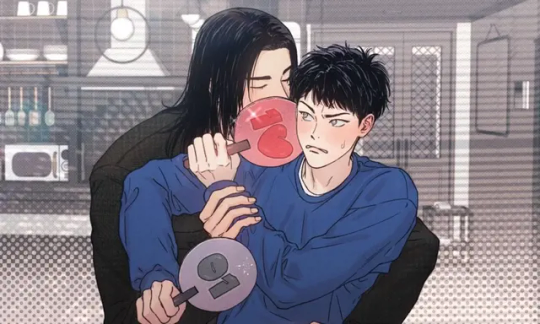
1 to 10 (원투텐) by NOD
Genres and Categories: Comedy, Romance, Smut, Yaoi, Uni life
1 to 10, from holding hands to kissing, everything in a relationship has to go according to plan for Gunjoon. You can’t just skip over one stage to the other, not when everything needs to proceed in order—you gotta hit those bases one by one. Then there’s Jungseok who’s the exact opposite, carefree and spontaneous and just looking for some fun. So just imagine Gunjoon’s surprise when after one drunken night, he wakes up in the same bed with none other than Jungseok. Looks like Gunjoon’s gotta brace himself for a romance that defies the 1 to 10 rule, a rollercoaster ride of a love that’s gonna blow his mind for sure…
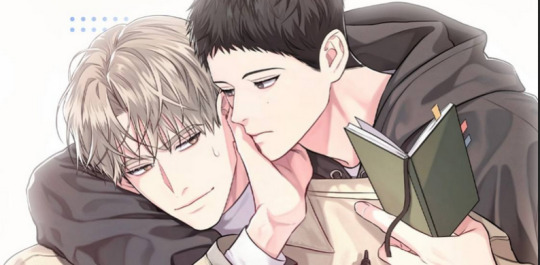
Don't Mix Business with Pleasure! (공과 사는 구분해!) by Hodot
Genres and Categories: Comedy, Romance, Smut, Yaoi, Uni life
Baek Dohu's a university student who writes BL novels on the side. And his preferred type of top character? The scumbag kind, who treats their partners like crap. And Dohu's first impression of Seo Juheon is the complete opposite: the typical nice-guy—always smiling, always catering to the needs of those around him. But things take a turn when he accidentally comes across Juheon blackmailing someone in an alley. The real Juheon is a polar opposite from the facade he puts up; he swears, he has a temper, he's manipulative…and Dohu loves it. Juheon could be THE inspiration for his next big novel that hit a dead end long ago. Excited, Dohu starts following Juheon around "observing" his character, which is bound to give Juheon some wrong ideas… Between the lines of artist and muse, business and pleasure, who'll be the first to cross the line over to the other side?

Hook, Line, and Sinker / Myungtae, You Little Rascal! (명태새끼 말려버려!) by Sitta
Genres and Categories: Comedy, Drama, Romance, Yaoi, Childhood Friends, Manipulative Character, Threesome, Uni life
Yang Kyesoo and Yoon Myeongtae are meant to be. Or at least, that’s what Kyesoo had always thought. With Myeongtae following him around and practically begging for his attention since elementary school, how could he ever get the wrong idea? So when the burly boy babbles off a list of qualities for his ideal boyfriend, Kyesoo is left shocked and stunned - because not one of them applies to him! In order to become the man of Myeongtae’s dreams, Kyesoo enlists the help of the campus’s captain of charm, the sexily seductive Kang Shinjoo. With Shinjoo’s guidance, Kyesoo will do his best to learn the tricks of the trade and reel Myeongtae in hook, line, and sinker!

Crossing the Line (선 넘는 사이) by Pangin (author), Hudadak (artist)
Genres and Categories: Comedy, Romance, Yaoi, Bisexual, Dubious Consent, Enemies, Sex Friends, Uni life
Han Garam’s roomate is rude, inconsiderate, and…okay, totally his type. But after overhearing him talking about how much he hates gay people, Garam knows he needs to seek revenge, and what better way than by getting off to gay porn in the other man’s bed! It would have been the perfect plan, if only he hadn’t been caught in the act by the raging homophobe himself, Yoon Jaehyuk. Jaehyuk is disgusted by what he sees but, with the RA refusing to let him switch, he has no choice but to try and force Garam to move out himself. An achievable goal, it seems, until one unexpected night of passion throws Jaehyuk’s world into disarray. Sure, he definitely still wants Garam to leave, but…why can’t he stop thinking about it?!
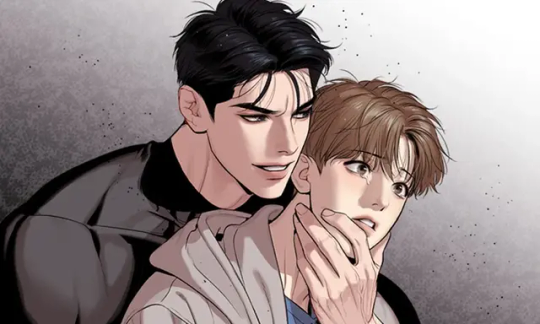
Jinx (징크스) by Mingwa
Genres and Categories: Drama, Smut, Yaoi, Boss-Subordinate Relationship, Martial Arts, Sports, Contractual Relationship, Debt, Dubious Consent, Rape, Toxic
Physical therapist Kim Dan has been down on his luck for as long as he can remember. Between an ailing grandmother, menacing loansharks, and an old boss making it almost impossible for him to find work, Dan is truly running out of options. Naturally, it feels like a dream come true when he’s finally hired to treat top-paid MMA fighter Joo Jaekyung, especially when the man then calls him out for a treatment the night before a match with an oh-so-tantalizing offer of five thousand dollars. He claims to have a “jinx” in need of a particular type of “treatment," but it's one that Dan isn't quite prepared to offer… You see, Jaekyung may be a beast in the ring, but he’s even rougher in the bedroom, and Dan’s not sure he can survive Jaekyung at his most primal. Nevertheless, the promise of much-needed cash has Dan agreeing to this ill-fated deal… Could a night together be the thing to help Jaekyung break this jinx once and for all?
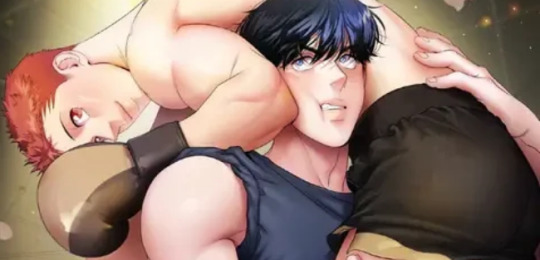
Fight Club (파이트 클럽) by AM
Genres and Categories: Adult, Drama, Mature, Romance, Smut, Sports, Yaoi, Boxing, Height Difference, Omegaverse, Rivals
OMEGAVERSE
Minchan lived life as supreme alpha. A friend recommended to Min-chan, who felt bored with this life, join , where someone's worth is judged solely by their martial arts skills. Minchan started with a light game and then participated in the game himself. When he gets tired of constantly winning in martial arts, he ends up losing to Tae-wook, who is smaller than him and an omega.
Minchan approaches Tae-wook with resentment for the defeat he experienced for the first time in his life, but his pride is even more hurt by their attitude, which seems to show no interest in him. Then one day, a heat cycle hits Tae-wook, and Minchan jumps at the chance to spend the night with Tae-wook… The beginning of a love fight with physical confrontations!
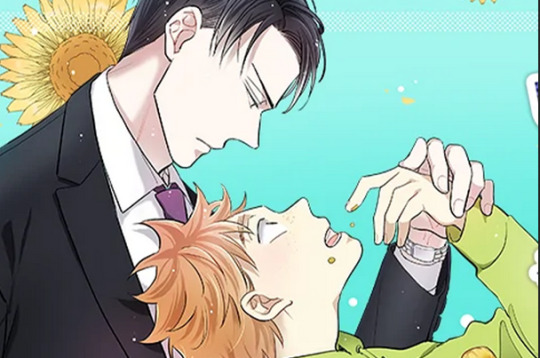
A Well-known Love Affair (명성이따르는연애) by PEANUT
Genres and Categories: Drama, Romance, Yaoi, Chaebol, Delivery Man, Depression
Woo Myung-seong, the next rising leader in the hotel world, was molded by his father to be a ‘masterpiece’. Although Myung-seong appears to be perfect in every aspect, in reality, he is losing his zest for life, exhausted by the pressures he endured since childhood. One day, Myung-seong runs into Jeonsu, a former highschool classmate, who works as a delivery man for a chicken restaurant. After this encounter, Myung-seong decides to use the inexperienced Jeonsu to change his mood under the guise of sharing his dating skills to help Jeonsu find a girlfriend. Jeonsu, who is sincere with all his emotions on display, a fool, begins to stir something in Myung-seong’s heart.
Ongoing webtoons | 1 | x | 3 |
#A Well-known Love Affair#Fight Club bl#Crossing the Line#jinx#jinx bl#Hook Line and Sinker#Myungtae You Little Rascal!#Don't Mix Business with Pleasure!#1 to 10#Perfect Buddy#XXX Buddy#Scent and Sensibility#Boundaries of Scent#Love Work Balance#webtoon#webtoons#bl webtoon#bl webcomic#ongoing webtoons#rec#list of recommendations#rec list#recommendation#bl rec#BL recommendation#status: ongoing#webtoon rec
2 notes
·
View notes
Text
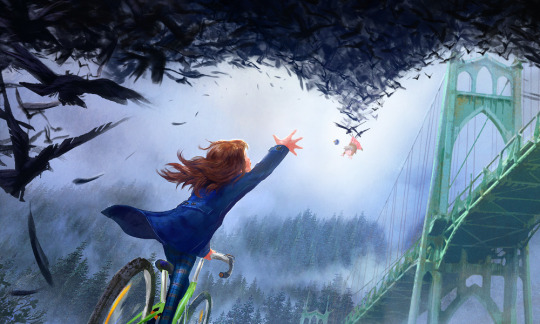
The Wildwood Chronicles
I've talked about this for what seems like to me, to death about this so I want to close the book on this and finally sum it all up because I finally have everything to say it about it in just one place.
It's now a full-on passion project that I really want to do, create and make a reality and that's The Wildwood Chronicles, an epic and ambitious adult-animated series that is a grand crossover between over hundreds — and I mean HUNDREDS — of media (movies, TV shows, anime, comics, video games) that retroactively establishes them all in the same shared universe all along.
Here is all the information, all of the notes/trivia/details, everything that I can tell anyone on this without spoiling anything about it because I'm keeping this shit under lock and key pretty much:
youtube
• The ambition with this project is anything but small. How I'd best describe it is a mix of Avengers: Infinity War (the last great MCU movie with only two exceptions afterwards) and Inglourious Basterds (Quentin Tarantino's greatest achievement since 1994) with the influences being not just those two but also Godzilla Minus One, Grand Theft Auto V, Red Dead Redemption 2, Gore Verbinski's Pirates Of The Caribbean Trilogy and the original Die Hard for many aspects of the series whether it'd the size, scope, scale, balance of characters, action, emotional moments etc.

• As for who's the lead and who'll voice him, the answer is Reese Miller both voiced by and modeled directly after Walton Goggins. When he's introduced, he's a down-on-his-luck, alcoholic, cynical, sarcastic and narcissistic schmuck with a criminal past who after an incident that caused his downfall had no choice but to crawl back to his family that he abandoned years ago and now has to deal with his ex-wife wanting him to do just one good thing in his life now and that's be there for his children. Only thing is it's on a certain day where his daughter is his that the main event that kickstarts everything happens and he's left in and later wakes from a months-long coma while his daughter, for a while, has an unknown fate. It's from then on that he becomes a man who is consumed with guilt and regret and is haunted by his past actions and the dirtbag he was with him wanting to and even becoming a better person in this world that's now falling apart. Unfortunately, all of the events that he's put through ultimately turn him into a tragic anti-hero who wants to see this world burn to the fucking ground and without giving any spoilers away, deals the final blow that seals this fictional universe's fate. Or does it? I seriously can't imagine anyone else in this role but Walton and Walton only.


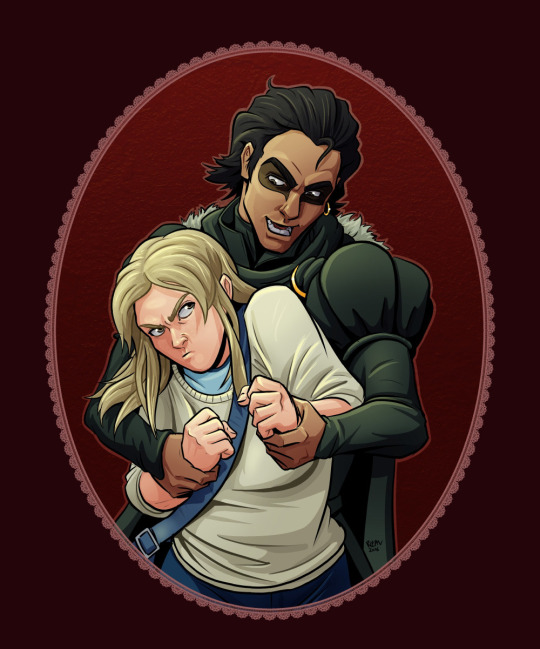
• As for how it will be a crossover, not only will it be a sequel years later, months later, weeks later depending on which media but also it's a strong balance of differentiations. Some like the three here will be major players and have major roles....

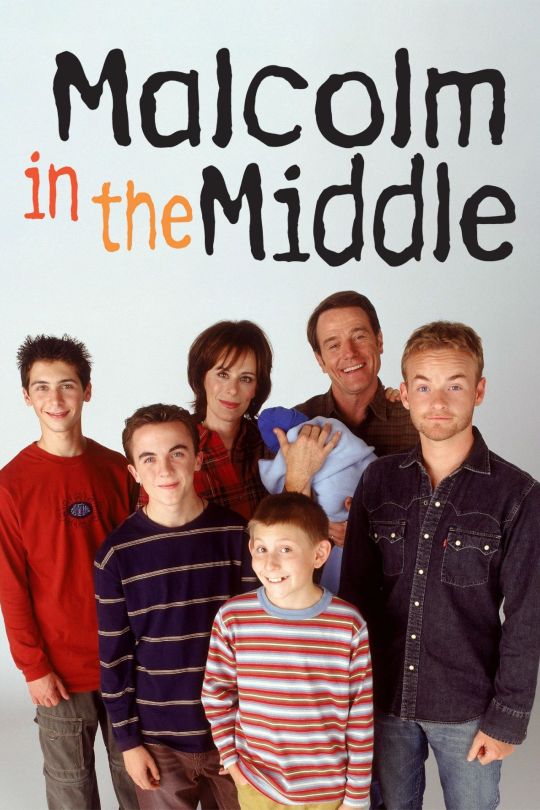

.... while others will be surprise supporting roles or even cameo appearances from supporting characters like these three here....


.... or are objects and items that serve as easter eggs that imply or show they're in the same world as well like these beautiful bastards here.
• As for the actual show itself, it will be a 65 episode limited series event with a clear and more than definitive beginning, middle and end. I want the whole show to feel like one long 65 episode feature film while at the same time giving each episode their own stand-out distinctions enough to make them stand on their own. Top of all that, there will be no commercial breaks and every episode will be a full two-hours long with them being treated as events you can't miss. What makes this more special is that there's only one network I have in mind for this series and that's FX.
youtube
• As an added bonus, the show will be incredibly and viscerally violent and even brutal with its gore. Hundreds and hundreds of people, creatures, superheroes, supervillains, zombies etc. will be killed in thousands of different and horrific ways with Rambo (2008), Blade II, aforementioned Inglourious Basterds, The Night Comes For Us and Hard Boiled serving as the main influences for the violence but it's not shock for the sake of shock, it's to show that the world is now somehow more dangerous and visceral than it's ever been before and to show that absolutely no one no matter who they are are safe.
youtube
• As for who are the directors, I want there to be several distinct and interesting filmmakers to helm episodes but the main one who'll direct the most episodes for he's the main director of the series will easily be Gore Verbinski.
4 notes
·
View notes
Text
Beauty and the Beast on the 18th century stage
A long time ago I promised you a handful of articles - and today it is time! I will begin with an article written by Catherine Ramond for the "Féeries" journal ("Féeries" is THE reference journal-review for all fairytale study and analysis), about the various theater adaptations of "Beauty and the Beast" in the 18th century France. As I also said before I won't do a literal translation, but rather "info-mine" as some like to say.
In the 18th century, every time a novel or short story had a huge success it was adapted to the stage, and so the fairytale did not escape. Ever since Charles Perrault and madame d'Aulnoy published their fairy stories, the "fairytale" had been a fashionable genre, and it offered to theaters a lot of material, especially since it craved magic and wonders. The story of "Beauty and the Beast" (La Belle et la Bête) especially had a lot of dramatic and scenic potential - as such the article compares FIVE different variations of the tale. Two of them are of course, the two literary versions of the tale, its two publications.
On one side, Madame Leprince de Beaumont's 1756 Beauty and the Beast, published in her "Le Magasin des enfants" (The Children's shop), THE most famous version of the story, and the one Cocteau used for his movie adaptation. On the other side, the ACTUAL first written/literary version of "Beauty and the Beast" titled as such, the one Leprince de Beaumont actually rewrote for her own book: Gabrielle de Villeneuve's Beauty and the Beast, inserted in her 1740 novel "La Jeune Américaine et les contes marins" (The Young American Girl and the sea tales). While this story was definitively "modern" in style and shape, it borrowed folkloric motifs (such as the theme of the animal-husband), making it a "cousin" to several of madame d'Aulnoy's fairytales (Serpentin Vert, The Green Snake ; Le Prince Marcassin, The Boar Prince), as well as a descendant of the model from Antiquity: Psyche's tale from Apuleus' Metamorphosis. This link between the new and ancient tale might have inspired the adaptators, since the tale of Psyche had been heavily adapted throughout the 17th century in different genres. 1656's Benserade and Lully's Psyche Ballet ; Corneille-Quinault-Molière-Lully's 1671's Psyche tragedy-abllet ; Corneille (Thomas this time)-Fontenelle-Lully's 1678's lyrical tragedy Psyche, etc etc... What we do know for sure is that the writers of fairytales and creators of stage entertainment of the time were well aware of the key elements of the story: Psyche's inhuman beauty, the oracle that offers her to a hideous monster, the jealousy of her sisters that causes bad advice (notably their encouragment to see the invisible husband despite it being forbidden). However... Against a Psyche perceived as a flaed character, against this weak, naive, curious Psyche, the 18th century opposes Belle, a Beauty who is kind and brave, and who instead of disrupting the order re-establishes a balance between the characters. The prince, turned into a Beast because of a spell must, to regain his true shape, have a young girl falling in love with him despite his horrible appearance. When Belle confesses her love and agrees to marry Beast, it makes the "beautiful Unknown" that she saw in her dreams appear before her, a Prince "more beautiful than love". This story reunites magic with a family drama (the relationships between Belle, her father and her sisters are at the forefornt of the narrative), while addng emotion and virtue: the fairytale had all the elements that would attract stage-writers and directors of the century.
The first "féerie dramatique", the first stage adaptation of this story was actually released between the two literary versions of the tale. It was the 1742's three-act versified comedy by Nivelle de La Chaussée "Amour pour amour" (Love for love), that borrowed elements from the very recent madame de Villeneuve's story (1740). The two last theater adaptations of the story were created after madame Leprince de Beaumont published her tale, and take inspiration from it. One is the ballet-comedy in four acts by Marmontel, with a music by Grétry, "Zémire et Azor" (names borrowed from Nivelle de La Chaussée). It had a huge success in 1771 when it was presented first at Fontainebleau, than at Paris. The second is a two-act prose comedy by madame de Genlis, "La Belle et la Bête", published in 1779 in her "Théâtre à l'usage des jeunes personnes" (Theater for young people). This play was for private stages, and had an open goal of educating children, by accentuating the moral aspect of the Leprince de Beaumont's tale. These adaptations truly show the wide variety of genres that welcomed the fairytale: a "classical" comedy, an "opéra-comique", and a small "moral treaty in action" for the theaters "de société".
The article wonders which elements of the fairytale were kept in theaters, and which ones were modified. There is also a brief recap of all the elements that encourage differences. For example, the fairytales are told through a third-person narraton, as opposed to the plays that need the characters to speak for themselves at the first person. Or how the literary fairytales are influenced by their context. Madame de Villeneuve's story was inserted in a novel, a "roman" as we call them in France, and as such her fairytale has "romanesque" aspects to it - for example by having inserted stories within the main story, which was a typical novel-device of the time. As such, when the Prince can freely speak again, he tells his own past through the sub-story "L'Histoire de la Bête", then followed by the sub-story of "The tale of the happy island" which unveils Beauty's true identity as the secret daughter of a King and a Fairy. The main story itself is divided in a double time: on one side the diurnal scenes, when Beauty and the Beast encounter each other, on the other side the nocturnal scenes, when Belle dreams of Le Bel Inconnu, which is the Prince. This dream-part of the tale will be heavily reduced, if not completely erased, in the other texts, while the two sub-stories evoked above will be removed from both the stage-adaptations and Leprince de Beaumont's rewrite. Beaumont's version is a simplified and linear tale, with its own context - a pedagogical one. Her "Le Magasin des enfants" is a dialogue between the figure of a "wise governess/knowledgeable nurse", and her most brilliant and obedient students - as such the fairytale is introduced, then commented, as a tale the children should study and find a message within. The narration itself multiplies the elements revealing it is the story told to children, such as this sentence "The beauty (because I told you before it was the name of the youth), so, the beauty, I said". This pedagogical nature, just like the romanesque overflow of the first literary tale, was removed by theater adaptations. When it reaches the stage, the tale only remains as what stuck in memories, as a pure fairy-story, which allows for its multiple metamorphosis and readaptations. Jean-Paul Sermain wrote about this in his book studying fairytales and concluded that, if a fairytale wanted to stay alive, it needed to escape its own context. This is clearly what happened with Beauty and the Beast.
And Leprince de Beaumont had already greatly helped the dramaturgists, by removing the romanesque elements of Villeneuve. Marmontel heavily used this to his advantage, with an adaptation very close to the tale - in fact, one of the main criticism against his "Zémire et Azor" was to have followed step-by-step the tale. People wrote at the time that what he did was just "Add some dialogues to a small story that isn't even his own". He was accused of "stealing" from Le Magasin des Enfants, of not having a single original idea in his own production, and basically one could read the book and have seen the stage ballet. Nivelle de La Chaussée's comedy, "Amour pour Amour", is further away from the literary story, especially since only madame de Villeneuve's story could be known at the time. This is also why it is the only stage adaptation that explains the metamorphosis of Azor/Beast due to the unshared love of a fairy, who in the play takes the shape of a romantic rival named Assan. La Chaussée also took another element from Villeneuve's tale: the dream where Azor appears to Beauty in "all of his brightness". Azor, like the Beast, is doubly punished: he has a repulsive physique, and he is forbidden from expressing his love. And here is the problem: how could the innocent Zemir pronounce the words "I love you" if she doesn't hear them first in her lovers' mouth? "Amour pour Amour" is, as such, quite close to Marivaux's theaters (comparisons can be made with his 1721's Arlequin poli par l'amour, for example). Nivelle de La Chaussée also gives to the story an Oriental aspect: the story takes place in a small town near Bagdad, Beauty and the Beast are given the exotic names of Zémire and Azor (later reused by Marmontel), and the family of Beauty are replaced by "confidents", which form a couple parallel to the main heroes, as it was usual in the comedy of France - the author also used these secondary characters as a way to deal with the absence of a narrative voice.
In fact, the absence of a narration is a problem for all three stage-adaptations. Marmontel gives to the father (Sander) a slave named Ali, who brings a comical letter ; while madame de Genlis gives to her Beauty (Zirphée) a friend named Phédime who is her confident, her match-maker, and a bit of her rival. But Marie-Emmanuelle Plagol highlighted that the character of the companion is fundamentaly "foreign to the fairytale", which is supposed to be "played in solitude". Only Marmontel kept the characters of the father-sisters, and the initial episode of the rose. Madame de Genlis went further away from the story by making Zirphée an orphan girl destined to a repulsive husband, while Phanor/Beast ravished her to escape an enchantment of unknown origins. All he says about this is: "Barian Fairy! Enjoy the excess of my pain ; your power, superior to mine, condemned me once to endure life under this hdeous shape, and I can't take back my first face unless I am loved, by touching with my scary face a soul that felt nothing before". So, while there are variations, the three stage-stories borrow from the literary versions A) the two main characters B) the key plot and C) the spectacular ending tied to words that must be pronounced.
Now, despite Mme Leprince de Beaumont heavily reducing the story, it still has a length that is hard to bring on stage... Yes the events and the "coup de theatre" are perfectly dramatic, but the stage cannot render as well the slow evolution of the characters and the feeling of time passing by. It doesn't help that the three plays studied here are relatively short - two or three acts (four for Marmontel's but only because there are long songs). Beauty's stay at the Beast's castle is a large part of the story plot - but it is not very "dramatic", and the characters are usually alone during this sequence outside of their brief daily encounters. For Mme de Villeneuve, this sojourn allowed her to describe at length the luxuries and the entertainments of the magical castle while the Beast, cursed with both ugliness and stupidity, avoided Beauty's company so as to not bore or disturb her, rather hoping the wonders would replace him. As such, the magic was a temporal one, alternating the various wonders Beauty discovered with the daily meals during which the Beast appeared and asked the same question, over and over again. The scene of the meal, first described in details, became shorter and briefer with each repetition - and this repetitive nature was essential to the tale, as it shows Beauty getting accustomed and used to the Beast - paving the way for her starting to like him... But it doesn't fit theater. Mme Leprince de Beaumont does a similar thing - the ritual visit is first a full dialogue, then shortened in one or two sentences. But the same idea of the repetition becoming an habit, and the habit allowing Beauty to overcome the Beast's monstrous appearance, remains. How can it be translated on stage?
Nivelle de La Chaussée, who only wrote two interactions between Azor and Zémire, delegates the descriptions of Zémire's growing love to the characters of the confidents. Azor describes to Zaleg how Zémire is getting accustomed to him in the very first scene ; and later insists on their daily encounters when talking to Nadine in scene 5. The slowness of Zémire's love does not come from the horror Azor causes her, but rather of her own ignorance of what love is: when Assan declares his love for Zémire, he actually helps his rival unwittingly, by allowing Zémire to discover her own love for Azor. Nivelle de La Chaussée is interested by something left obscure and undescribed in the tales: how the characters realize and understand their own feelings. Marmontel, meanwhile, synthetizes all of the daily encounters between Beauty and the Beast in one scene (III, 5) and has Zémire/Beauty say herself "Seeing you so much, my eyes got accustomed". As for Genlis, he offers three encounters between Zirphée (Beauty) and Phanor (The Beast), during which Zirphée becomes bolder and bolder. But this compression of time always causes a same phenomnon among the three authors: the appearance of the Beast is modified, to explain such a fast change in relationship. The theater-Beasts are not as repulsive as the fairytale-Beasts, their monstruosity is watered-down.
However, while all the theater adaptations compress the time-dimension of the play, it is to better highlight the spectacular of the final transformation - always done alongside a change in sets. This was the most "dramatic" lement of the fairytale, and it shows. The decisive word of the Beauty, who agrees to marry the Beast, causes the dénouement, the de-transformation of the Beast into the Prince. In the two narrative versions, the words have an immediate effects - as soon as Beauty pronounces the words, the magic operates. Of course, the theater potential of such a scene is enormous: a "key" word causing a final "coup de théâtre" - and transformations of stages and sets were very, very liked at the time. As such all three plays have a common dénouement. At Nivelle de La Chaussée, when Zémire says "Yes, it is Azor that I love", the theater turns into a woodland, a clearing of orange-trees with a cradle of flowers among which is Zémire's statue. At Marmontel's, when Zémire says "I love you, Azor, I love you..." the theater turns into an "enchanted palace" and Azor is sitting on a throne in all of his beauty. And for Mme de Genlis, when Zirphée says "Yes, Phanor, I loved you ; yes, I cannot live without you", music resonates, and Phanor appears from the back of the stage in his human form, sitting on a throne of flowers. And Azor's explanations in the various plays also all sound similar: "Yes, I am that Genie that..." "Yes, I am this dreadful monster, that you did not hate despite his ugliness". However, there is one specific change from the fairytales: in the stage-plays, Beauty just has to declare her love ; while in the original tales, she has to either agree to sleep with the Beast, or to marry him. Again, we see a sentimental and psychological shift linked to the "weakening" of the Beast, not as threatening and not as monstrous, even in what he asks of Beauty.
While the wonders of the final transformation caught the eyes of the playwright, it wasn't the case with the other magical eements of the tale... Mme de Villeneuve's castle was an "enchanted palace", filled with fireworks, wealth, singing birds and monkey-comedians. When she opened the six windows of a room, Beauty could see the plays given in the four great theaters of Paris at the time (Comédie Française, Comédie Italienne, Opéra, Foire Saint-Germain), plus a view of the Tuileries and one of the "spectacle of the world". This careful "mise en abyme" of the "theater as the world" or the "world as a stage" was not kept by stage adaptations. In the written story, they were somptuous entertainments meant to distract Beauty from her loneliness and boredom, while showing how the Beast's muteness could be compensated by immense power and infinite wealth. But again, the loneliness of a bored Beauty and the forced stupidity of the Beast were not fit for the theater. Each playwright finds a different way to replace these wonders. Nivelle de La Chaussée opposes the seduction of wealth (embodied by Azor's rival, Assan, who in truth is the fairy in disguise) and Azor's pure love, who only has flowers to offer to Beauty and prefers to be loved for himself (he is very Marivaux-like). Marmontel rather decides to mix the luxuries with the Oriental exotic: the only indication for Azor's palace is "a wealthy salon, decorated in an Oriental way. Flower-filled vases between the windows" ; Azor's appearance in the third act is preceeded by the sight of a throne of flowers rising in the middle of the room, and a dance of genies. As for Mme de Genlis, while she does take back elements from Mme Leprince de Beaumont fairytale (lots of books, lots of wealth, the clavecin), the exploration of the palace is condensed in the second scene of act III, and while it works as a temporary burst of wonders, it does not reflect a daily cohabitation.
Finally, Marmontel and Mme de Genlis reuse the magical items of Mme de Beaumont, such as the magic mirror in which Beauty saw her family. Marmontel turns it into a magical painting: the family of Beauty appears at the back of the stage, framed like a painting, Zémire can hear them but not talk to them and it all disappears when she tries to touch them. (This stage trck had a huge success). The other magical item was the ring that teleported Beauty: Marmontel links the ring with the modifications of the sets, since it allows to alternate between the father's house and Azor's palace - but Marmontel does add a cloud to transport Sander and Ali. It might be a remnant of the Zephyr that carries Psyche and the other characters of Apuleus' tale. Within Mme de Genlis' play, Phanor's powers are also embodied by the ring that conferes to Zirphée ubiquity and the power to grant wishes, but ultimately the ring will be useless. However, Zirphée finds within the ring's box the final letter of adieu of Phanor - and it is reading this letter that causes Zirphée's declaration. The magical object is replaced by a very traditional and common item of theater: the letter.
The most extraordinary, strange and fascinating element of the tale however is the Beast. This horrid, scary beast that Mme de Villeneuve describes in terms of "abominable screams, terrible noises, a furious expression, a trunk like the one of an elephant, the enormous weight of his body, scales clicking with each movement". Aurélia Gaillard highlighted that this heavy, loud, scaly elephant-like body could be interpreted as an imperious, exhuberant sexuality described in monstrous terms.Mme Leprince de Beaumont attenuates a bit the Beast's horror because he is never described - he is said to be horrible and to have a frightening voice, but the Beasts laments more about its "ugliness" than its "monstruosity" - and in fact, the Beast can become quite ridiculous, such as when, in an attempt to sigh about its own sad fate, it "whistles so loudly all the walls of the castle shook". How can this be translated on stage?
The stage-Beasts, with their strong, exotic names of "Azor" or "Phanor" have barely anything in common with Villeneuve's monster. Nivelle de La Chaussée's text must be decyphered to understand what the Beast looks like: Azor is said to have been given an "hétéroclite" face which, in this context, actually means an "aged" face. Zaleg, Azor's confident, highlights the fact Azor is an old man in these words: "If the Fairy had left us our charming traits, / I could have tolerated ; but, Lord, we look like as if / We were about to enter the season before autumn." The fact Azor's punishment is shared by Zaleg also attenuates it. Within "Zémire et Azor", the only exact physical description appears in the list of characters: "Azor, young Persian prince, in a scary but not hideous shape ; black eyebrows, a bushy beard, a thick mane, arms and legs naked but covered by a tiger-like skin, the rest of the body clothed by a vest and a rich belt ; in behavor and action, he is a nobleman." We are far, far away from the monster! In fact, the plays have to convey the Beast's scariness through acting: in Marmontel's, when Zémire first sees him she faints, and Azor laments that it was his own ugliness that caused this. In Mme de Genlis' play, since no description is offered, we only have Phanor's words ("horrible face", "repulsive appearance"), and a few acting movements (Zirphée doesn't dare look at him ; she flees when he comes near her). But he is only a monster in appearance, as he proves to be a good, generous, sensible, delicate and faithful person. In fact, Marmontel gave his Beast a beautiful voice and pleasant words - even going as far as having him sing! In fact, it is because there is a discrepancy between Azor's appearance and his speech that Zémire believes an enchantment might be at play.
These psychological (the pangs of love) and moralizing (virtue is to be loved) trends completely erase the frightening voice, and the rude manners of the book-Beast, who had been "deprived of his mind". Villeneuve's Beauty complained that she could not talk to the Beast, she lamented herself that the Beast only spoke four or five sentences to her, and always the same ; a "stupidity in speech" that contrasted with the eloquence of the Beautiful Unknown of Beauty's dreams, and that also opposed itself to the long romanesque tale the Beast, free of his curse, offered to his audience. The Beast' slow humanization came through him speaking more to Beauty, and in a more galant way, and her noting in his speech softness and sincerity. By giving the Beast eloquence from the get-go, by removing his "stupidity", the playwrights made him closer to another famous fairytale character: the Prince Riquet of Perrault's fairytales. Riquet with the tuft was, just like the Beast, cursed by fairies to be ugly until love made him handsome, but ulike the Beast he wasn't cursed with idiocy - on the contrary, his eloquence was his main tool to win hearts. Yet another play that echoes Riquet as much as "Beauty and the Beast" would be Favart's "La fée Urgèle", a "féerie" inspired by a fairytale of Voltaire: created at Fontainebleau in 1765 with a huge success, then regularly played by the Italian Comedy, it depicts the strange romance between a fairy transformed into an old woman and the knight Robert. The metamorphosis of the act IV, where, with "the sound of thunder" the miserable hut becomes a splendid palace, echoes the stage-transformations of the "Beauty and the Beast" plays. In fact, the morality sung in the end seems like a watered-down version of the "Beauty and the Beast "lesson: "You have not disdained ugliness, / You deserve to be loved by Beauty.
The Beast's monstruosity disappears alongside its very name of "Beast". Usually appearing only in the title, the Beast becomes "Azor" or "Phanor" - and it is quite a paradox to see this sonor dimension of the name "Beast" disappearing, despite this posing no problem for the stage. In the narrative versions, we only have "Beauty" and "the Beast", and the dialogues do work fine. The exotic names chosen for the character remove the ambiguity and the wordplays originally used to conceive him, humanizing the Beast even further - and firmly setting his male identity, since "la Bête" is a female-neutral name. This need to give a precise name and defined identity to theater characters seems to reflect a deeper difference when it comes to genres: the theater relies on the words of the characters, and as such has difficulties depicting bestiality, aka what is deprived of words. The rare questions asked by Mme de Villeneuve's Beast were "impertinent" question: while it can be written that the Beast rudely asks "Do you want to sleep with me?", it is harder to have the character pronounce it on stage. And yet this sexual element (greatly watered-down within Leprince de Beaumont's version) is a key feature of the fairytale type of the "animal-groom", and seems to reflect, as Bettelheim wrote, that "sexuality is an animalistic action, that only love can turn into a human relationship". The theater must focus entirely on the romance due to what it cannot show and cannot tell ; in turn, this allows us to see the great freedom of the fairytale, which can name and show a "desiring body". By making the Beast human, the theater weakens the strange and disquieting element of the tale: the relationship between the human Beauty and the monstrous Beast was unexplained and unexplainable. As Jean-Paul Sermain said, the strength of this tale relied on the silence when it comes to the amorous choice, and how inexplicable or aberrant it is. Maybe this "shadowy" part of the tale disappears because the theater-character must always explain and analyze? Fairytale characters are lonely characters, who do not offer their inner thoughts to anybody. By giving them confidents, the playwrights allow them to explain their actions. We can think of Sedaine's "Raoul Barbe bleue", in which Bluebeard explains why he killed his wives - an element unrevaled in the story. This, alongside Bluebeard being named "Raoul", works to "desenchant" the tale.
The two public plays, those of La Chaussée and Marmontel, were enormous successes. Restif de la Bretonne, a great fan of fairy tales, wrote his enthusiasm for "Zémire et Azor", and his passion for the "Magical Painting". These plays were fitting perfectly the expectations of those that went to see a comedy or opera-comique. All in all, the three stage-plays explored, each in their own way, the dramatic and scenic possibilities of the tale, wile sprinkling it with exoticism and strengthening its "lesson" aspect. Psychology and rationality dominate within these plays, going against the very spirit of the "marvelous" of the fairytale - but by twisting the tale, they played their part in its history ; through their transformations and metamorphoses, they maintained the sense of mystery, pleasure and surprise brought by these variations and extensions. Today, cinema is continuign what the theater did before. But the difficulties the adaptations had to face back then highlight the limits of each genres. The first literary version of the tale could not fit fully the stage due to its "romanesque thickness" and its complex narrative structure - and as we saw, the most drastic change brought by the shift to the stage is the Beast, who becomes a new avatar of "Riquet with the tuft", an ugly but virtuous candidate for love. And moral as well as historial constraints forced the playwrights to remove the monstrous, the stupid, the loud, the sound and the fury - in short, the body in all of its ugliness from the story. Instead, the plays focused on the charms of the eloquence, and on the reward of kindness and virtue.
#beauty and the beast#translation#beauty and the beast adaptation#french stuff#theater#18th century theater#french theater#fairytale theater#fairytale plays#beauty and the beast plays
5 notes
·
View notes
Note
I really like your characterization of Sokka. Not only in Gladiator, but in all your atla fics. You make the most of all his comic potential and his tendency towards drama and over the top reactions, but you also don’t exaggerate it to the point of making it his only trait. Your dialogues between him and Azula in Gladiator are wonderful. Especially when you get to explore their playful banter. It doesn’t mean I don’t enjoy the more serious moment we’re currently going through in the story.
:D Why, thank you, nice anon! I'm really happy to hear that!
I feel like it's not easy to strike a balance with a character like Sokka. A lot of fics I've read make him too jaded, too dark, too brooding... then, there's others that make him too goofy, too light-hearted, too optimistic. And while there's shades of truth in all those characterizations, and of course, those characterizations might make sense within their specific context, I feel like Sokka is slightly more complicated than that. That's one of the reasons why he's such an interesting character to write about for me, and what made him such an entertaining character to behold in canon, too.
I do love unleashing his comedic potential as often as can be, and frankly, Azula just promotes that part of Sokka so easily x'D there's just an innate potential for comedy in those two, made even better by the fact that they appear to have similar senses of humor. I just looooove writing them interacting, which should be obvious considering I've been doing it for ten years and I STILL can't get enough of it! The latest Gladiator chapters have been difficult to write because of the lack of banter, really. I miss it so much...
But yeah, sometimes Sokka has to reach the other end of the register and take things very seriously, such as how it is right now in Gladiator. Even then, comedy can happen at times if you feel like it, as the author... but when things get REALLY serious with Sokka, it kinda feels like hell's going to break loose. And part of what provides that feeling (at least, one of the reasons why I think that effect happens when I'm writing him) is the fact that there's such a strong contrast between his leisurely self and his more serious, darker side. It feels like finding Sokka's voice becomes a much smoother process once you finally hit that balance and can do justice to the multiple aspects of Sokka's complexity and potential.
#anon#sokka#I love writing him#and I love how authentic he feels when I write him with her#they're more themselves when they're together somehow#*cries*#I'm gonna get them back to each other this year somehow#I have to#yeah you guys probably wouldn't see it yet but I just need to#my heart demands it
3 notes
·
View notes
Text
Mindful Streaming: Choosing Content That Enhances Your Mental Health and Personal Growth
In an era where streaming services are at our fingertips, the vast ocean of available content can sometimes feel overwhelming. It's easy to get lost in endless browsing menus, jumping from one show to another. However, the content we consume can significantly impact our mental health and personal growth. Adopting a more mindful approach to streaming can transform passive watching into an enriching viewing experience that contributes positively to our well-being.
The Power of Selective Watching
Mindful streaming begins with the conscious selection of content that aligns with your values and goals. Instead of allowing algorithms to dictate your viewing habits, take charge by choosing shows and movies that inspire, educate, and uplift. This proactive approach ensures that your screen time contributes positively to your mental state rather than detracting from it.
For example, documentaries about nature or human resilience can boost your mood and expand your understanding of the world. Similarly, series that focus on personal development or overcoming challenges can provide motivation and a fresh perspective on your own life's hurdles.
Understanding the Impact of Content on Mental Health
The link between media consumption and mental health is well-documented. Certain types of content can exacerbate anxiety, depression, and other mental health issues. For instance, binge-watching suspenseful dramas or reality TV shows with negative interactions can leave you feeling anxious or stressed. Being mindful of how different genres affect your emotional state can help you make better choices about what to watch.
Instead, look for content that is known to foster positivity. Comedies, for instance, can be a great way to alleviate stress. Shows and films that portray strong, positive relationships or that feature characters who grow and overcome adversity can also serve as excellent tools for fostering a healthier mindset.
Balancing Entertainment and Education
One of the great benefits of streaming services is their ability to offer both entertainment and educational content at the click of a button. Balancing these two can be critical to a healthy streaming diet. Educational documentaries or series can provide insights into new subjects and perspectives, enriching your knowledge and understanding.
Moreover, many streaming platforms offer courses or lecture series that can contribute to your personal and professional development. Dedicating part of your viewing time to such content can be immensely beneficial, turning leisure time into an opportunity for growth and learning.
Curating a Personal Growth Playlist
Just as you curate playlists for music, consider curating a selection of shows, movies, and documentaries that contribute to your personal development goals. For instance, if you're looking to become more knowledgeable about wellness, queue up content related to physical and mental health, yoga practices, or nutritional documentaries.
This personalized playlist can serve as a ready-to-go selection when you're unsure what to watch, ensuring you have a beneficial choice at your fingertips that aligns with your long-term growth and interests.
Setting Boundaries and Time Limits
Mindful streaming also involves being aware of how much time you spend in front of the screen. Excessive screen time can lead to a variety of physical and mental health issues, including disrupted sleep patterns, decreased physical activity, and impaired social interactions. By setting boundaries and designated viewing times, you can enjoy your favorite content without interfering with other important aspects of your life.
Implementing specific viewing times, perhaps dedicating an hour or two in the evening or on weekends, can help maintain a balance between digital and real-life interactions. Moreover, screens should be avoided at least an hour before bed to ensure better sleep quality.
Engaging with Content Actively
Instead of passively consuming content, engage with it actively. This means thinking critically about what you watch, discussing it with others, or even journaling your thoughts and reactions. This active engagement can deepen your understanding and appreciation of what you're watching, and it can also help cement any lessons or insights you gain from the content.
For example, after watching a film with a moral dilemma, spend some time reflecting on how you would handle the situation presented. Such practices not only enhance your viewing experience but also contribute to your personal growth by challenging you to think critically and empathetically.
Mindful streaming is about making intentional choices that align your media consumption with your personal values and growth goals. By choosing content that enhances your mental health and actively engaging with it, you turn your streaming time into an opportunity for learning and personal development. In doing so, you not only enrich your life but also set a foundation for continual growth and well-being in our increasingly digital world.
0 notes
Text
DRAMA REVIEW | Rikokatsu (2021)

At first hand, Rikokatsu comes across as a lighthearted comedy but I would think it twice before writing it off as just that. Personally, I think this drama presents itself as a easy to watch rom-com but it is full of social commentary about Japan's current situation in relation to their low marriage rates and high divorce rates among older people.
Saki, our leading lady, is a competent fashion magazine editor who comes from a progressive family. Because of this, she's not only committed to her work but values her independence and looks a partner who will respect these attributes. On the opposite side we have Koichi, leading man, who comes from a military family with traditional japanese values. Love triumphs over their differences, at the beginning, but cohabitation makes it impossible to look past some blaring problems in their every day life.
The drama never makes Saki say it out loud but she's clearly a feminist, this is one of the main reasons that catapults the problems in their marriage. Koichi expects from her what his mother did for his father: follow the man's rhythm of life, make all the meals, cleaning, etc. I want to make point out that Koichi it's not misogynist because he does respect Saki and sees her as an equal, in fact, when she calls him out on things he changes his behaviour but it's clear that it never occurred to him that a marriage could look different than the one his parents had. On the other hand, Saki doesn't know how to adapt to some of Koichi needs or behaviour that are absolutely normal as a couple because she's used to her parent's marriage where each person had their own thing to the point of not having family meals together once at home.
I found their situation as a mirror of Japan's society as a whole. Cosmopolitan, interesting, independent but also with a deep rich ancient tradition. These two characteristics seem to complement each other well, at surface level, but the social issues in the country it is proof of the imbalance between the two.
I mentioned that Japan currently has a high divorce rate among older people. Marriages of decades that "suddenly" crumble. Well, both leads' find themselves in the situation of having to deal with their parents' divorces because of all the reasons I wrote about before.
Most of the drama it's about a couple finding a balance and accepting there's not one way to be a family. That marriage can look very different according to the needs of the two people involved in the relationship.
Technically speaking Rikokatsu it's really good. The cinematography really beautiful and camera work a mix of traditional and more dynamic. The performances are really good from all the cast. The leads, Kitagawa and Eita, are full of charm and fleshed out their characters in a compelling way. There are no bad guys, just two people trying to figure out life.
For all of these, I fully recommend Rikokatsu.
#rikokatsu#jdrama#kitagawa keiko#nagayama eita#review#2024#how to get a divorce for the whole family
1 note
·
View note